Uruguay - The New Land Of The Free?
This is a guest post from a member of the Phyle community

In recent months, there's been some curiosity and intrigue towards a certain part of the world. Be it Argentina, Uruguay or Latin America in general. In the case of Uruguay, the vast majority of people couldn't locate it on a map or might get confused with neighbouring Paraguay. As you will know from being a part of the Phyle however, Doug and Matt have talked at length about Uruguay for the last few years now. They have also managed to persuade others like me to join them along the way.
Having recently relocated to this perfectly calm / neutral / 'boring' country, I thought I would provide a summary and breakdown of some of the reasons as to what tempted me to consider Uruguay as a new home. Plus what the country offers to libertarians and others alike.
Context
I came from the U.K. which may be useful as a point of reference. In recent years, the U.K. has wanted more and more involvement in people's affairs. It became too much to foresee a solid future there. The desire was not to run away, but to find a place more aligned with my growing libertarian leanings. A place where I could care more about incompetence than dystopia.
Throughout this write-up, I try my best to show both sides of the coin. Uruguay is not perfect by any stretch, but it has ticked all the boxes I am looking for as a man in his 30s. Included are both positives and negatives from my first year inside the country, to cast a light on what Uruguay offers (and not) from many different angles:
Contents
Doug Casey on Uruguay
Geopolitics
National Debt
Banking
Tax Benefits
Food & Agriculture
Lifestyle & Culture
Energy
Water
Inflation
Economy
Residency
Politics
Digitalisation
Real Estate
History
Demographics
Firearms
Drugs
Regions
Further Reading
Doug Casey on Uruguay
Listening to Doug & Matt over recent years provided reassurance to me to come to discover this country for the first time. Here are some of their thoughts on Uruguay from podcasts & articles:
37:55 - Uruguay Not Getting Invaded #208
09:54 - Anything Worrisome in Uruguay? #244
40:00 - Participating in Uruguayan Society #248
43:11 - What’s Happening in Uruguay? #151
00:00 - Uruguay Adopting a “Green Pass” #147
16:30 - Uruguayan Bank Accounts #274
03:01 - Doug’s Farm in Uruguay #105
53:05 - Immigration to Uruguay #105
27:55 - Which country will work well? #201
31:26 - Birth in Uruguay vs Brazil #206
05:18 - 3rd World Countries vs U.S. - NomadCapitalist
Article - Why Doug Lives in Uruguay - InternationalMan
Geopolitics
The main reasons for me choosing Uruguay was for the fact that it is generally a laissez-faire society, it is resource rich plus it is a country with an unparalleled history and desire today to stay neutral.
We'll explore some of these themes in greater detail below, but here is a recent podcast from FinancialSense that captures Uruguay’s unique offering in the chaotic world of today.
National Debt
National debt to GDP for Uruguay was 51.9% in June 2023. This is a stark contrast to the U.S. at 123%, U.K at 101% or Japan at 224%. Uruguay recently issued a bond of equivalent $700m at 5.6%, with international demand for $2.6 billion. It's never ever been easier or cheaper for Uruguay to borrow money on international markets. Uruguay has never had a lower country risk rating than it has today.
Banking
Uruguay is an underrated financial behemoth in banking, offering savings & salary accounts in both dollars and Uruguayan Pesos with ease. There are many options, for locals and foreigners alike.
You don't need to be a resident to open a bank account here either. Of course it helps to have a bigger balances, but for non-residents there may be fixed costs as much as $30-$40 per month to keep the account open. Even some local accounts for Uruguayan residents can involve a monthly cost, sometimes in the region of $3-$5 per month.
A paper-trail is of course required to open a bank account and the requirements are documented here. The main banks are Scotiabank, Banco de la Republica, Itau, BBVA, Santander & HSBC. There is also Banque Heritage and OcaBlue which I gather are just online. Then there is Prex which has become somewhat of a neo-bank.
If withdrawing cash using a foreign account and seeking a bank to do this at, the national bank Banco de la Republica is likely best. They will charge few if not zero fees, for both Pesos and Dollars.
Tax Benefits
Uruguay is currently the exception in Latin America. Other countries in the region are seemingly adopting the 'tax the rich' mindset under international or political pressure. Uruguay isn't buckling.
Many articles out there call Uruguay a tax haven, but consider it just 'light touch'. There are still plenty of taxes as you will see when reading the specific section below.
Residency is attainable so that you can take advantage of tax free-holidays and some lucrative financial savings. If this article generates any interest and you would like to pursue a new residency or citizenship here, two companies are worthy of attention: Punta Consultants and Andersen Legal. Having done the process alone in recent months without an adviser, I would certainly recommend working with someone to speed the process along. Particularly if you value having a full head of hair and wish to settle-in quickly.
I should also state that for an accurate account on all the financial benefits for you, that you should speak to an accountant rather than relying on the below information as gospel. Best efforts have been made to provide accurate and up-to-date information as of November 2023 but your circumstances will likely differ.
Here is the TLDR on tax
Firstly, Uruguayan residents are taxed on all their income generated inside the country (see 2).
Residents are also taxed on some foreign income generated from capital investments abroad (e.g. securities, dividends & interest from loans/bonds).
Income arising from foreign real estate (rents) and from sales of foreign properties are not taxed by Uruguay. No exemption is required for this.
1. Tax Holidays
Individuals who become residents through the investment route may opt for an 11-year tax holiday on foreign income OR receive a permanently reduced tax rate of 7% on it.
2. Income Tax
Uruguay has one of the lowest levels of income tax in South America. The rate for income tax is progressive, ranging from 10% to 36%. Which would kick-in once you earn 475k pesos or ~$12,000.
3. Capital Gains (IRPF or IRNR)
Uruguay has a 12% capital gains tax.
4. Other Income
Other types of "income" are also taxed at 12%. e.g. foreign-sourced (as mentioned above), but also rents and interest earned in Uruguay.
If however you can qualify that your income is from technology work, you may be able to receive this income tax-free. Speak to an accountant to establish if this is the case for your circumstances.
5. Net Wealth Tax (Impuesto al Patrimonio)
A net wealth tax exists of 0.1% to 0.3% above $150k for residents.
Note that it is $150k as the threshold, under this and Uruguayan tax residents need not pay a wealth tax. Families/partners can double this threshold also if married, so no wealth tax is payable up to $300k.
A net wealth tax also exists for non-residents of 0.7% to 1.5% but only on the wealth located inside the country.
6. Inheritance Tax
There is ZERO inheritance tax here. A big potential benefit to families.
7. Property Taxes
On Sales (Impuesto a las Transmisiones Patrimoniales or 'ITP') - When trading property, there is a 4% tax (3% for certain successions) on the property value. 2% is paid by the buyer and 2% by the seller.
On Profits - See Capital Gains (IRPF IRNR) above.
Each Year (Contribución Inmobiliaria) - An annual tax payable to the local government at a rate of between 0.25% to 1.40% on the rateable value of the property.
8. Value Added Tax (IVA)
Value-added tax (or IVA) is 22%.
Restaurants - If using a foreign credit card, you will pay 9% less on the bill. Effectively a free tip for staff. During certain periods, it can be more I’m told.
Hotels - Presenting foreign identity will mean IVA will not be applied for stays. I recommend verifying this at check-in.
IVA is also not applied for exports or financial transactions.
9. Sales / Consumption Taxes (Impuesto Especifico Interno)
Beyond the regular IVA discussed above, Uruguay does apply certain additional tariffs on certain products. For instance alcohol, tobacco and gasoline tend to attract a higher additional tax amount.
10. Other Tax Deductions
Self-employed people can enjoy an income reduction of 30% for "expenses".
Deductions from social security can be made when dependent children exist in the family.
If you wish to create your own business, there are also plenty of additional tax exemptions, special economic zones and benefits to explore beyond that. Particularly in software but also for importing/exporting of goods.
For example an agreement with Brazil in 2023 now means that goods produced in certain Uruguayan tax-free zones are deemed as produced within Mercosur (and vice-versa), attracting 0% duties & taxes.
An individual is considered resident if in Uruguay for more than 183 days in the calendar year or if his/her economic or centre of interests (i.e. investments) is in Uruguay. The tax year in Uruguay also runs January to December for simplicity.
International Tax Reporting
It’s also worth mentioning that Uruguay is not currently part of the Foreign Account Tax Compliant Act (FATCA) so the Uruguayan Government is not compelled to share information about your accounts with U.S. Government agencies or their counterparts around the world for the time being.
Food & Agriculture
Uruguay has the most cows per person in the world (3.2). And the same for sheep (3.5) per head. It has just 3.4 million people. And yet there used to be even more sheep per human (about 8 per head in 1991) until beef become far more profitable and popular in recent years.
It has a proper healthy cowboy ('gaucho') culture, and the agricultural sector is a significant contributor to Uruguay’s economy, accounting for approximately 7% of the country’s GDP.
There are frequent cowboy events happening year-round, with farming festivals, traditions and communities, everyone is proud of their heritage.

You really haven't lived until you've tried a Uruguayan or Argentinian "entraña" steak. Asados (barbecues) will have you turning carnivore within days. This Latin American country currently exports 70% of its meat to more than 100 countries, with China, the European Union, North America, and Russia as its main markets. China being Uruguay’s 2nd largest trading partner for beef. Today, Uruguay meat is selling at prices similar to those of Australia and the U.S. given the quality. Whereas six or seven years ago Uruguay sold at between 20-30% less. Between Argentina and Uruguay, they really do raise the best beef in the world.
Uruguay is one of the few countries that sits above the Guarani Aquifer, which is a reservoir that contains an almighty amount of water. This provides Uruguay with rich and fertile land that is used for agriculture, timber and wine.
Culturally, Uruguayan food is about quality ingredients and little fuss. Sauces and spices are sparingly used and the latter are difficult to obtain. For instance chillies are essentially sweet peppers here, not spicy by any standards. If you are fond of heat, it may not be the worst idea if you were to forget that you had some seeds stored away in your luggage. You would be popular with expats and immigrants certainly. This is a frustration shared by Europeans, North Americans, Indians and even some folk from Latin America.
Lifestyle & Culture
Positives
Uruguay boasts some of the most beautiful sunsets in the world, as you're soon about to witness. The country is mostly flat, at least along the coast, with beaches stretching the length of the country for 700km total. It is more developed than you will expect on arrival. Almost Europe, replanted. During summer months in particular (December, January, February) it is common to be sat along the coast sipping the national drink, mate, a South-American infused tea alongside friends and a view. Uruguayans, like most of their South American counterparts, are very welcoming and hospitable people. They are also incredibly sporty and bonkers for football (soccer).
Here's a video to get a sense of the atmosphere of the Montevideo coastline, as well as a few amateur photographs:
Differences between left and right, rich and poor are not incredibly pronounced here. The whole country’s history is made up of immigration, plentiful food, solid gun laws, strong European vibes, meat and a cowboy-culture.
Locals are usually shocked to see a 'Westerner' want to come to their country other than for work reasons. Very rarely do I get questioned on anything else besides “why on earth did you want to come to Uruguay?” during initial interactions.
Another positive is how cars give pedestrians right of way when crossing. Even in the big cities no matter the rush, it's part of Uruguayan culture to wave you across the road. Unique but refreshing!
We will go into the history of Uruguay in a later section, however this 18min video from 1943 is almost as fitting today. Demonstrating how strong the Uruguayan culture has remained. "Nothing spectacular", "Nearly all of it's land is useful" still rings true:
Not So Positives
Something to be mindful of in any country but particularly here, is that it can take some time to feel accepted by local Uruguayans. I have heard it is particularly challenging for other South Americans, who are used to more warmer interactions (e.g. Mexicans, Brazilians, Colombians, Venezuelans). Just like in parts of Europe, people are fairly private and so it may a few meetings before being invited to someone's home. Once you get that invite however, you can be confident you have a friend for life.
Uruguay is more expensive to live than most places if you’re on a budget, but the peace & pace of life can more than makes up for that. Uruguayans also dine late and greet with a kiss like Spaniards and Italians.
The culture for doing business here is slow. Like really slow. Sometimes it feels like as the customer, you are receiving a favour by purchasing the services of a company. Therefore do not be surprised if you need to chase, follow-up or find someone else for the work. I wouldn't go as far as saying Uruguayans are lazy, it is just the "tranqui" way.
Personally speaking, people are very much left to themselves. You can live a very humble & introverted life here. Perhaps that is why they do have an issue with isolation, depression and mental illness in this country, especially males in rural regions.
We touched on driving earlier, but be advised that there is a zero-tolerance approach to drink-driving here. Authorities have the right to revoke Uruguayan licenses and confiscate foreign driving licenses for 6 months if deemed under the influence.
Climate
Summer (Dec, Jan, Feb) is a blast here. You can expect temperatures between 25°C to 35°C, or 75°F-90°F. Many families tend to head east to their second homes, enjoying time in the beach towns near Piriapolis & Punta during this time. Work pace often slows during this period. The heat can be intense and humidity can add to that, but overall it is really pleasant. The ozone layer is a little missing here, so care with the sun is advised.
Winter (May, June, July) in Uruguay is mild, usually 10-15°C or 50-60°F. What was new to me for the first time was the humidity during cold weather. Being simultaneously chilly and also humid in the comfort of your own home, is not something you will ever get used to or miss.
There's some incredible architecture nestled amongst all the newer 10 story apartment blocks and new builds in Montevideo. For me, it makes me appreciate the historical houses even more, like you're encountering hidden treasures. That said, buildings in the major cities are often not built with the best insulation in mind. It may be best to seek out more modern apartments with thicker walls, insulation and glazing. Otherwise buildings may be susceptible to cold (or worse, wet) walls during humid days of the year, in spite of having adequate heating & air-conditioning.
Energy
The Uruguayan government has invested strategically into energy for decades, with minimal corruption along the way. Having deployed $8bn into renewables since 2010, it is now looking to take a leap forward in hydrogen, given it's vast water reservoirs underneath it's flat terrain. A few months ago Uruguay signed a MOU with the EU to export hydrogen and has potential to make further deals.
On the business side, Microsoft for instance has chosen Uruguay as its 4th A.I and I.O.T lab. Google has just announced a new data centre in Uruguay also. For such a small country in terms of population, tech & energy business is booming.

Resources in Uruguay are plentiful yet expensive in comparison to the region. The country is in the advantageous position of having abundant resources to export. For the past 4 straight months in 2023, it has generated 100% renewable energy. In comparison, neighbours Argentina have only managed an admirable 55%.
Currently, prices for fuel, energy, food, consumables, vehicles and tech hardware are much more expensive than countries nearby. You will notice this in many of the graphs shared. Perhaps prices won't need to rise quite at the same pace as the rest of the world given the fact commodities won't be in such short supply here.
Uruguayans have been flocking to Argentina still to stock-up on inventories due to being about 50-60% cheaper. 4% of the entire population made the trip across the border in one single weekend and ⅓ of Uruguayans visited Argentina in Q3 2023. Crazy numbers! These price differences are apparently costing the Uruguayan economy around $1 billion per year. You have got to imagine the gap will close somewhat, especially given recent developments across the water in Argentina.

Firewood
It is extremely common for Uruguayans (and Argentinians) to cook dinner over wood or charcoal, on the parilla, or using older gas cookers indoors. Especially as mentioned on Sundays.
Many also use wood to warm their houses. In the colder months of May, June and July, walking through the city you get that cosy firewood smell because of this.
Uruguay is blessed with vast forests spanning the entire country. It has a massive timber industry and celebrates it. When driving outside the capital for example, you'll notice countless people selling firewood on the edge of the road. It is one of the only countries in the region whose forests have actually expanded in recent decades. In the 1990s they occupied 660,000 hectares and now they’ve surpassed 850,000 hectares, providing raw materials for the wood and pulp industries.
Oil & Gas
Oil & Gas today is completely imported. You could say it is still Uruguay's achilles heel. For decades Uruguay has tried to find oil. Its previous auctions attracted industry leaders but with only dry wells found. That is likely what led the country to pivot fast into renewables. A few months ago, there was a potential oil discovery 100-300km off the shore of Uruguay, suggesting there MAY be significant oil reserves to be able to extract. Apparently with the potential to unlock up to 20 billion barrels of oil. Should that be the case, it could relieve some future cost pressures but not in the short-term. Uruguay has hydro, wind & solar as we saw in the graphic above. It is certainly not as exposed to wars or other geopolitical events as before or as much as elsewhere.
With that in mind, if you were the head of this country, now might be a good time to negotiate their access to these fuels, particularly with the country's favourite commodity (cattle) and other parts of its economy doing well. Perhaps that's why we see the President on a whirlwind schmoozing tour currently. More on that shortly.
Today, prices remain higher in Uruguay for petroleum oil & gas than elsewhere in the region. Not helped by the additional levies Uruguay applies on them. Gasoline fluctuates between 40% - 75% more expensive than in neighbouring Brazil and Argentina. However fuel discounts are available near those borders to offset some of the difference.

'Green' Energy
The overwhelming majority of people are still running gas & diesel cars, in spite of fuel being the most costly to run in all of South America. From 2022 until 2023, the Uruguayan car fleet went from 2% to 3% being electric vehicles.
They plan to also have 30% of city buses being electric in 2 years time. The transport in general in the capital of Montevideo is pretty good. Buses are regular, quick and reasonable ($1.20-$1.50 per trip). It was surprising to me that the city doesn’t feel like a capital at all, so very little congestion apart from 1 hour each in the morning and evening, making it extremely accessible.
IEA (International Energy Agency) created a comprehensive report on energy in LATAM in 2022. In this table, you can see how Uruguay fares and just how much oil & gas is imported:

Water
In the capital of Montevideo, the city experienced a water issue a few months back, where they needed to import some oil for a short period due to a lack of hydro in the area. The water issue was only for a few weeks and exclusive to Montevideo. The reservoir nearby dried up and that caused a bit of a stink (figuratively), needing to pump salt water from the sea into peoples homes & taps. People went to buy bottled water to drink & cook with for some time. It was more of an inconvenience than the reported 'crisis'. Although citizens were not hugely happy with water being used to cool those large data centres at the expense of their pockets & health. Hopefully they’ve learned from that and put in place improvements so it won’t happen again. The rest of the country was unaffected, smaller cities and towns have plenty of water, energy & resources to go around.
Inflation
CPI (Consumer Price Inflation) since 2021 has risen 20%. Comparable vs Western countries.
PPI (Producer Pricing Index) since 2021 has risen 14%. vs 40% in Europe, 25% U.K. and 18% for U.S (if to be trusted). This is where Uruguay may continue to outperform given its energy security.
The Uruguayan Peso has strengthened vs the dollar since September 2020 by 16%. Mostly since Uruguay's economy is bolstered by commodities, rising in value. It's a step change from 2013 when Uruguay was investing heavily in infrastructure and devaluing their currency in preparation for this decade. That happened during a commodity bear market, today that is no longer the case. Back then, 1 dollar bought 13 Pesos and inflation was not a problem. Today it buys 39.
It wouldn't be a surprise for me to see the Uruguayan peso outperform the dollar this decade. Perhaps not for the next few months, but through to 2030. It's a productive economy with low debts, zero animosity and is punching above its weight on all fronts. Long may that continue.
The biggest issue facing the country could well be whether they can quickly find a long-term solution to oil and gas supplies. Particularly when other countries seek the same. They have significant trade deficits in fuels currently, though they are in a more fortunate position of having diversified their energy greatly.
Economy
Top Exports - Accounting for 84% of all outgoing shipments in 2022.
Meat: US$2.9 billion (25.8% of total exports)
Oil seeds: $2.1 billion (19.1%)
Wood: $1.1 billion (9.7%)
Dairy, eggs, honey: $894.8 million (8%)
Cereals: $819.1 million (7.3%)
Vehicles: $438 million (3.9%)
Plastics, plastic articles: $352.8 million (3.2%)
Animal/vegetable fats, oils, waxes: $293.4 million (2.6%)
Milling products, malt, starches: $289.5 million (2.6%)
Pharmaceuticals: $184.6 million (1.6%)
Top Imports/Deficits - Significant trade deficits for crude, oils & gas for 2022.
Fossil/mineral fuels including oil: -US$2.1 billion
Machinery including computers: -$1.2 billion
Vehicles: -$1 billion
Electrical machinery, equipment: -$795 million
Fertilisers: -$679 million
Other chemical goods: -$382 million
Plastics, plastic articles: -$298 million
Iron, steel: -$194.3 million
Articles of iron or steel: -$194 million
Organic chemicals: -$189 million
Day to Day
Back to the more important stuff - the daily life. What is Uruguay like to live in?
Supermarkets and pharmacies are pretty much run by a French monopoly in Uruguay. There’s lots of brands but all with the same/similar owners, which is perhaps a contributing factor as to why veggies and consumables are 2x-3x more expensive than neighbouring countries. It is also intriguing to see a pharmacy every 2 blocks in Montevideo.
Food in supermarkets as mentioned is decent quality and well-sourced, but like in any place it's often best to opt for the local markets or “ferias” and building relationships there.
Uruguayan food products tend to be well-labelled (in fact overly so). In 2020, it was apparently the case that 37% of corn-based products in the capital, which led to them introducing the mandatory labelling. If you see a circular 'T' label on packaging, it means it contains genetically modified organisms. 'T' standing for "transgenic":
These stickers are prevalent on most packaged food products, both in Uruguay and Argentina. I mentioned that earlier in the year a water issue arose in Montevideo. When that happened the 'exceso sodio' meme (right) went viral. This was at a time that authorities needed to send desalinated salt water from the sea into people's homes. Even during this so-called "crisis" it was encouraging that people still retained their sense of humour without losing their heads.
In terms of buying online, Amazon does ship to Uruguay, but it is quite common for some packages to be held back by customs. I have had success delivering to my destination, but for larger packages apparently it is 'safest' to arrange delivery via a local courier. Couriers don't always guarantee the 'last mile' of delivery nor retain high standards. Glic, Tiendamia & BuyBox import goods from United States with ease, while DHL & UPS are decent options as international couriers.
Service Businesses
In 2023, Uruguay's service exports grew the fastest in the entire region at 28%! That's more than double what we see elsewhere in the region. It also leads the region in terms of AI research & development. Uruguay's connectivity, free-trade zones, high quality of life, deep pool of talent (inc. from nearby Argentina) & attractiveness to do business is attracting capital. Many software businesses can effectively pay 0% tax via legal exemptions that exist.
Creating a Business
If you are looking to setup a business in Uruguay, there is opportunity.
Once you are setup, if you are responsive and value your customers; you may soon find yourself at an advantage over other local firms. In many industries, you can compete on speed, quality & service.
From talking to others in the Phyle here, Uruguayans when making big purchases value having warranties and someone to call. It could be the newest bit of home technology, vehicle, energy infrastructure or agricultural kit. Locals here will likely want someone to call to solve their problems. Furthermore, they are very resourceful and willing to 'make do' repairing rather than replacing parts. Something to be respected, given the difficulties of sourcing parts here.
There are plenty of types of business you can setup, each with different tax treatments and which are not at all costly to setup or administer. Here are 2 options I considered for some context:
A a small trader / proprietorship (called 'Unipersonal') that costs in the region of $100 and can take 3 days to setup. This is a general business that can cover many different contexts and industries. There is no legal distinction between your personal capital and that of the business.
A SAS business (equivalent to LLC or Ltd company but for entrepreneurship). This costs around $1,200 to setup and may take considerably longer, up to 2 months, due to additional due diligence. Although some professional firms have companies 'ready to go' for you to repurpose in a matter of days.
To open a new business you will need: an Uruguayan ID, registration with gub.uy (the gov site) followed by enrolling with bps (a separate part of gub.uy). Not all systems always talk to one another, which led to some delays my end. You will also need to secure proof of address (or 'domicilio'), if you have recently arrived. Many accountants here are used to creating companies to assist residencies, so don't be shy in reaching out to one for advice in the process.
The country boasts not only a seaport and an extremely modern airport, but it also has a large number of free trade zones in which multinational companies working in Uruguay can operate without having to worry about import taxes.
The Uruguayan Government has just launched a new website on how to invest or create a company in the country. The new English site provides a wealth of information including details on formation, hiring, patents, regulations and certifications for many key industries. It’s a useful place to start.
Jobs & Salaries
Uruguay was the 1st country in the world to adopt the eight-hour workday, early in the 20th century. It has also slashed its informal labour market by half since 2010. Laws do favour the employee somewhat, so it is more expensive to hire here than other nearby countries also.
Without doubt, exports are still the main focus of Uruguay’s economy. Agricultural goods such as cattle, soybeans, or wood pulp are exported to be an important contributor to the nation’s economy, as mentioned. Construction and Civil Engineering are popular too, but it is the Tech & Services sector that has grown to become a huge market for Uruguay.
Many youngsters have been trained & educated well in engineering and so they’ve created a solid career path for both civil engineers and software engineers, diversifying the economy in recent years.
Real salaries are at the highest level in 50 years. They continue to grow above the rate of inflation. There is an expectation that this continues to the rate of 3-4% for next year (an election year).
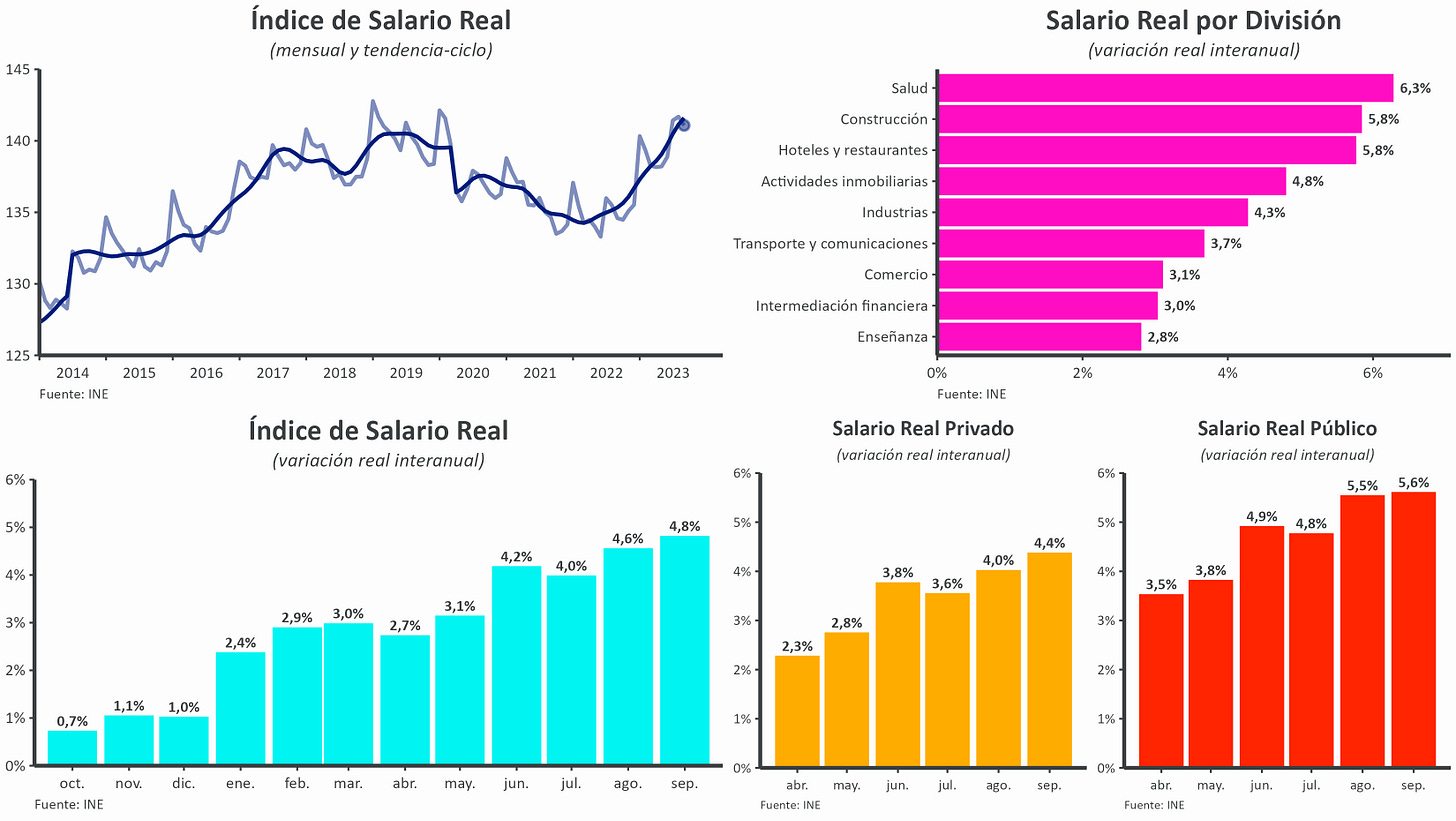
Real wages are still significantly lower than Western standards with the minimum being ~$540pm and the average ~$950pm. These are not as low as you see in Argentina, where the average was just $345pm for October 2023. Those in software, civil engineering and health laboratories earn much more than this. Uruguay is starting to see larger real wage increases across the board, suggesting solidifying fundamentals and the labour market outperforming or discounting inflationary effects. In the pink chart above, you can notice this particularly in people-heavy areas such as health, construction and tourism (6% YoY).
In spite of offering higher wages, many younger Uruguayans have traditionally found it challenging to save, given the much higher costs of living compared to neighbouring countries (2-3x depending on some products). Therefore growing real incomes is a welcome trend change.
The labour market is very competitive given it is a small country and so companies tend to favour hiring Uruguayans over other immigrants. Something to be mindful of, even as a Westerner seeking employment.
Healthcare
Uruguay offers great public and private healthcare. When looking privately, there are an abundance of luxurious clinics with very professional staff. Uruguay is also the envy of other nations, with a well-run healthcare system. The private Fonasa healthcare option is most popular with 2.5m of the 3.4m population enrolled. If you have your own business or are an employee, you can enrol with a reasonable cost deducted from your salary each month to then receive basic private care included. "Extras" are heavily subsidised and therefore it is likely worth looking into once here.
Another bonus with healthcare here is the proximity to Argentina. Uruguay has strong ties to Argentina to share expertise. It is not uncommon for people (as we mentioned earlier) to travel to receive treatments or medicine from across the border.
Residency
1. Residency for Individuals
Anyone with a monthly income of $1,500 can apply & qualify for temporary residency. The minimum amounts are higher than in other Latin American countries due to the higher cost of living. This will grant you a stay of 2 years in the country should you be accepted.
2. Residency for Family
If you are a family of four, the main applicant having an income of $2,000 is permissible. It’s advisable that the minimum income for a family of four be a total of $3,000 and/or over. Same 2 years.
3. Residency for Mercosur
If you or your spouse are from a country in the Mercosur region, the process is somewhat simpler.
The non-Mercosur family member will still need to show proof of income to sustain themselves, but are granted 2 years in order to provide this evidence. Provided that all other paperwork is in order, this will give them suitable time to find a job in that time.
4. Permanent Residency via Birth
Uruguay is one of the few countries in the world that will grant both parents Permanent Residency once a child is born inside their borders. Some friends in the Phyle are currently going through this process also, and we hear it could be a simpler process than in neighbouring Brazil.
5. Citizenship
After obtaining residency, you can become a citizen in just 3 years if you're married or 5 years if you're single.
Note that you will likely need to be physically present for 9-10 months in the first year to claim this. On an ongoing basis, the requirement is to be in the country for 6 months (183 days) of any given year thereafter. Uruguay do wish to see you have ties to the country in order to grant you citizenship.
6. By Investment
For a person to become a tax resident by having main economic interests in Uruguay, they must invest in real estate or an enterprise and stay in Uruguay for at least 60 days per year.
The minimum amount accepted for a real estate investment is $390,000. The minimum amount for an enterprise is $1.7 million, provided it creates 15 jobs.
7. Passport
Uruguay is mentioned by the NomadCapitalist in the top 5 destinations for expats. The Uruguay passport is a great travel document, allowing the customary passport-free access to all of South America's Mercosur region as well as visa-free access to Europe’s Schengen Area. But it not always be the very best option.
One limitation of the passport is that those that receive it have found their document states their original nationality on it, given Uruguay's Constitution is unique and defines nationality based on place of birth. This has led to some additional questions and conversations at some international borders from friends of friends who used their Uruguayan passport, particularly to visit their stated country of birth. You may be fortunate to gain a passport but you will never be considered a true Uruguayan national until that law changes.
8. For Help with Residency / Citizenship
9. Documents To Collect
If you're feeling almost ready to start the process within the next 6 months, get your affairs and the following documentation ready:
police & criminal record checks (any country resided-in the past 5 years)
birth certificates, marriage certificates
proof of income & bank statements
all documents will need to be legalised with an apostile from your home country (they remain valid for 6 months)
10. Temporary Residency Process
If seeking temporary residency, the process is documented officially here, but my experiences are summarised below. It’s worth noting that by working with one of the consultants, they may be able to speed things along for you:
As soon as you arrive in Uruguay, if interested in residency you will need to secure yourself a local health card and pass various health checks. This can all be done in a day, equipped with your passport. At the end of the day you will receive your health card (‘Carne De Salud’) valid for 2 years.
Register online with immigration and upload scans of the required documents you have gathered, together with a copy of health card obtained. After upload, you will be able to secure yourself an appointment with immigration, likely for a few weeks time.
Next up you will attend your immigration appointment. This is where they will check the originals of the uploaded documents you submitted and ensure everything is as expected. The originals are reviewed but not retained at this stage. If all is well and as expected, they will provide you with the information you need to pick-up your temporary ID card via another appointment.
When you attend this new appointment for the ID you will go to a separate office to share your biometrics & your passport, which they will then use to create your residence card (‘Residencia En Tràmite’). This can be created for you on the same day. On busy occasions (in my case) you may need to collect a week later. This temporary ID card grants you a stay in Uruguay for up to 2 years with your ‘Residencia En Tramite’ status.
In the weeks that follow if immigration successfully processes your entire application and you are successful; you will be contacted and requested to collect a new ID card with a new status of ‘Residencia Legal Provisoria’. However you should start the final step prior to this.
Finally, after obtaining the ‘Residencia En Tramite’ card, it is necessary to submit the original birth & marriage certificates you shared in step 3 and have the documents officially converted to a Uruguayan format (as ‘Inscripción de partidas extranjeras’). This final step can take up to 9 months to process due to demand at this in time (hence why Step 5 may come first). Once they complete this very last step, you will be asked to collect another ID card now with the status of ‘Residencia Legal’. Now you are at last on your way to becoming an honorary Uruguayo/Uruguaya. Renewing your residency will be much easier, I promise!
Politics
Behind El Salvador, the country with the highest approval rating for politics and state of democracy is Uruguay.
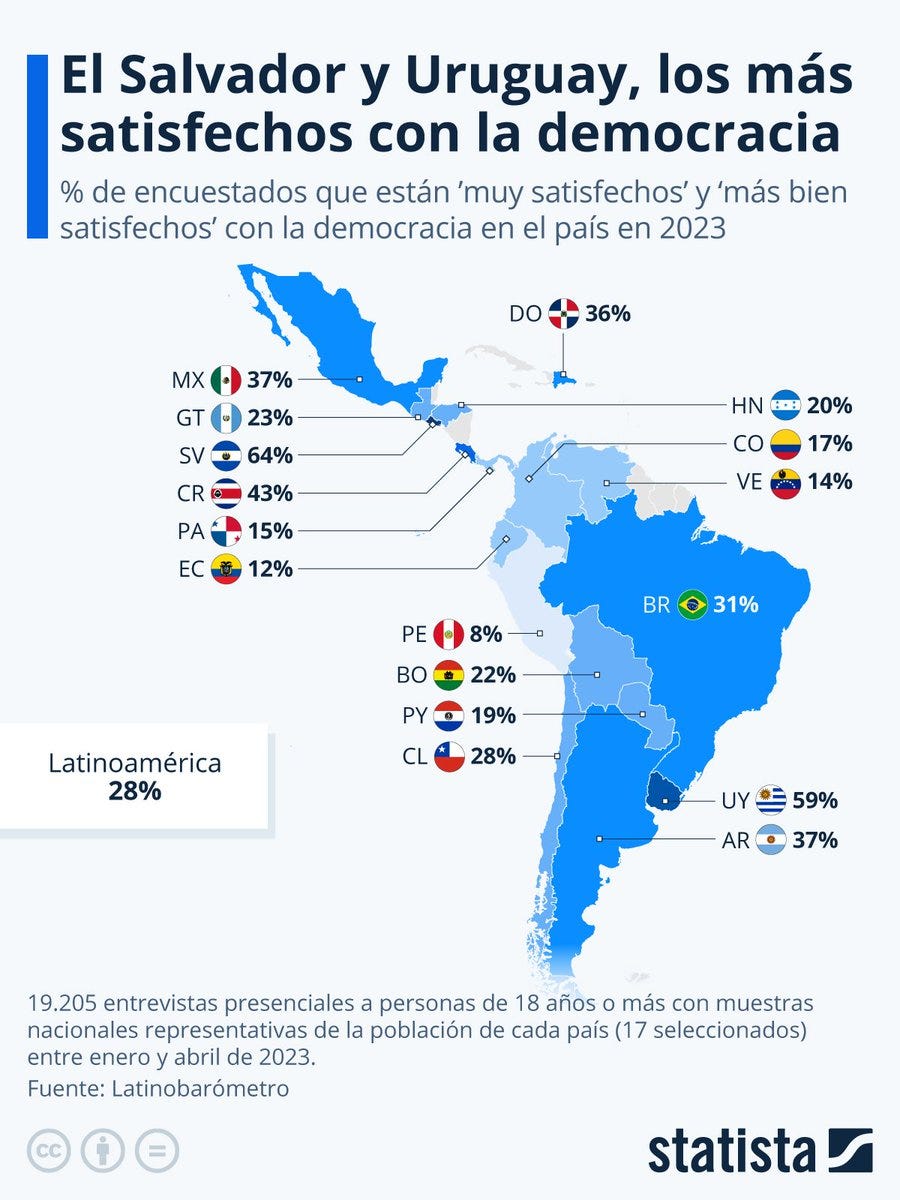
In 2020, Uruguay got its first center-right president after 15 years of left-wing rule. Next year, October/November 2024 there will be a new election. Recently, in light of a 'passport scandal' the current President has had to reshuffle some staff with his own approval ratings taking a hit. His approval rating was 46% earlier this year, but the noise on this issue has quietened down most recently.
Digitalisation
Internet is really great here - with 90% of households having access to fibre. There is always decent broadband and cell coverage (given the whole country is flat). Cheap too.
Starlink recently came online here via with someone in the Phyle achieving 250MB+ down, 50MB+ up via their global roaming plan. An official local launch is expected to happen in 2024, alongside Argentina & Paraguay.
The cashless card culture has expanded and is quite common. I’m becoming one of the minority in local markets still using cash. It’s still used but much less than other Latin economies. In major cities like Montevideo and Punta del Este, cards are really prevalent. They have hooked people in with 15-20% discounts in cafes and restaurants if you have a certain branded card. Now people use cards daily.
On the plus side, you can exchange significant amounts of dollars for pesos or vice versa without any sort of identification whatsoever. It's refreshing to walk in & pay a competitive rate and to exchange money without being asked your name. To not get asked about what you plan to do with your depreciating dollars, or your travel plans etc. In the U.K., even exchanging $100 felt like an inquisition and a favour I was being granted.
You need to present ID to get a SIM card like most countries, but it’s still a simple process. In terms of authorities, they have rolled out a “digital ID” here for all public services, but their systems don’t often talk to each other at all, which is why I’ve had to show my identity in physical offices 3 times to advance through the different immigration systems and processes, e.g. health, gov website and business registration.
Uruguay had a CBDC (Central Bank Digital Currency) trial. It's now a 'sleeping beauty' and inactive. Prex, which we mentioned earlier, has become incredibly popular allowing Uruguayans easy and lucrative exchange rates between the Uruguayan Peso, Dollars, Argentinian Pesos, USD and more recently 'crypto'. With Prex you can pay bills, people, or almost any service without any friction at all, just by using the app and your national ID. The private sector is often way better at innovating this stuff and so perhaps Prex would be a great vehicle to bootstrap their CBDC in future. Time will tell.
In Montevideo and Punta del Este, unavoidable white cameras are commonplace, having been kindly provided by their Chinese friends in 2019. Talking to locals, the cameras have almost eliminated petty crime from most parts of the city, which was a problem in years prior. Elsewhere in smaller towns this is much less prevalent, but Uruguay's major towns and cities are not unlike others in the world today on this topic.
Real Estate
Overview
For anything real estate related in Uruguay, the LiveInUruguay site is a great resource. As is this page with latest stats. Many big purchases like houses and cars are denominated in dollars, just like neighbouring Argentina. Anyone of any nationality can rent or purchase a property in Uruguay. It makes no difference if the person is in the country or is a Uruguay resident. Everyone is treated the same.
Renting
Most places available for rent are for 12+ months. It is not very common for Uruguayans to hop around when renting. Quite often they'll stay in the same building for 5+ years given the inconvenience that comes from moving day and the costs of new agreements.
Both renting & purchasing property comes with quite a few additional costs. To rent via an agency, you need to purchase insurance. In order to obtain that insurance you normally need to have an income or be employed in the country. Useful when you're Uruguayan, but it is a little more tricky when you are finding your feet in the country for the first time.
Note: Each time you sign an extension to your existing tenancy agreement, you will need to pay the agency 1 additional month of rent for practically zero work or effort on their part. It is just how it is. Something to consider when negotiating length of contract, it may be worth agreeing a longer term. It is not impossible to rent directly with property owners, but will require paying for many months up-front most of the time.
There are some useful aggregated sites to scour the market, namely Infocasas and MercadoLibre. The best deals are available by word of mouth, particular between March and November, when demand is lower outside of summer.
Another strategy is to use short-term rentals like Airbnb for 4+ weeks when first arriving and then reaching a longer-term agreement directly with the owners depending on availability and your experience.
Buying
The housing market as of August 2023 has been found to be “strong, buoyed by robust demand and healthy economic growth”.
In Q1 2023 alone, the average price of a house in Uruguay rose by 18.6%. In the capital Montevideo that was a bit more muted at 4.4%. During 2020, nationwide house prices plummeted by 20%, as both demand & supply fall sharply. The following year, transactions increased 25% in 2021 and 15% in 2022. Montevideo accounted for the biggest share of about 34% of all property transactions in Jan-May 2023, followed by Maldonado (17%), Canelones (13%), Rocha (6%) and Colonia (5%).
If you are serious about buying, the bigger agencies are often better. There are some smaller companies that rank well on Google that may try to take advantage of "gringos", but it is rare. If you find a listing you like, it has been mentioned by other members in the Phyle that you may wish to say you have an agent or representation. If the company gathers you don't have an agent on the buyers side, you will pay both agents 3-4%.
You should calculate that between estate agents fees, all expenses and tax, transaction costs on a purchase will be around 8% of the purchase price of your property in Uruguay. 10% deposits are usually commonplace.
Future Outlook
Real Estate is of course much more pricey near the coastline cities, given the stability and views on offer. However the further east you go from Punta Del Este and the further West you go from Montevideo, the cheaper coastal properties will be.
There are some decent properties directly listed from owners themselves, where you can browse on MercadoLibre .
Prices have been risen dramatically in recent years, due to the sheer number of Argentinians coming to park their capital in banks or purchase property in the country. Previously Argentinians had protection by the Uruguayan Government from the Argentinian Government. This bank secrecy is about to be unwound, leading perhaps to better growth potential to be in Argentina going forward rather than Uruguay itself.
Doug was of the view that undoing that secrecy will lead to reductions in property prices in the country. You can already see the effect on residencies this year in the below chart:

Obviously, should Uruguay become a popular destination for Europeans once more, that may net out all being equal, but this is definitely something to be monitored.
Construction
When building a home here, expect the building process to be slow and frustrating. Even Uruguayans complain about how long it takes to renovate, extend or construct homes in their own country. And it is not even the permits that are the issue, it's the labour. Skilled labour is in high demand.
Expect most constructors will ask for 50-60% as a downpayment to begin any work. In western countries, we are generally used to putting 20-25% down. With that in mind, you will want to be very careful about the type of contractor you choose, as your options will be limited if your team is slow or worse-still taking advantage of you.
If you work in the construction industry, and are competent, charge reasonable and flexible amounts, there will be a huge amount of demand for your construction skills & services. Not least from expats but from Uruguayans themselves.
Vehicles
Acquiring a car is really expensive, regardless of whether you buy new, used or are importing. Just accept that you will pay much more than in the U.S. or Europe regardless of your approach. Take care with used cars and dealers in particular here too.
It is a challenge to source used car parts here and so the preference is to purchase new, given there is a guarantee if anything happens to your vehicle. As mentioned previously, Uruguayans value having someone to phone and fix their problems. New car dealerships rarely budge on price, and won't negotiate against other dealerships. The Uruguayan way is that they don't need your business. Your best bet may be to try and get some free 'extras' like car mats, spares or fuel thrown-in.
Importing cars can also be costly also. All cars, both new and used attract a 23% import tariff. For trucks it is 7-8% and for new parts 22%. Uruguayan citizens can only import 1 used car every 3 three years apparently. Once you secure your residency you have a relatively short window of time to start the process to import your vehicle(s) and belongings without incurring any import taxes. You get one shot at this. Plus the vehicle cannot be sold for 4 years.
For renting cars, I've used Mariño Sport on numerous occasions, with no 'hidden extras'. They have a facility in Montevideo and in Punta Del Este and can provide an airport drop-off or pick-up services.
History
There was a brief period of time that Uruguay was part of Brazil (1822-1828). A war between Argentina and Brazil over the territory eventually led to the good ol' British "intervening" to create a buffer state. This buffer state became neutral and became Uruguay. It is still neutral today.
While Uruguay didn’t play a significant role in either of the two world wars, it did break diplomatic relations with Germany on both occasions and was one of the founding members of the United Nations in 1945.
Uruguay has experienced significant waves of immigration from all around the world, specifically from Europe. Today 90–95% of the Uruguayan population has European ancestry, particularly Spain and Italy. The largest immigration occurred before and during World War II, when the whole European continent was in turmoil. The population ballooned from just over 1 million to 1,953,000 by 1939.
WW2
During the Great Depression, Uruguay maintained the United Kingdom as a major buyer for Uruguayan meat, wool, and related products and avoided calls for the nationalisation of foreign, or otherwise, business interests
This article on the history of refuge in Latin America mentions that official immigration to Uruguay became increasingly more difficult during World War 2. Something to be mindful of if history rhymes. During those years, the tough economic conditions put pressure on farmers in the countryside, leading to many leaving their farm work and migrating to the capital city of Montevideo in search of jobs.
With the government's efforts to expand Uruguay's industrial capacity, these migrants found jobs which thus sped-up the urbanisation of Montevideo. The growth of the industrial sector in and around Montevideo would continue to expand through the WW2 era.
Today
Uruguay may be able to perform a similar role this decade. The current President Luis Lacalle Pou was pictured on numerous occasions directly next to Biden throughout the APEP conference, in early November. Just this last week he had been on a visit to China also. Seemingly having secured a free-trade deal for his country and playing both sides of the global pantomime of politics. China is currently the 2nd biggest market for Uruguayan beef and is predicted to become its primary market in the coming years, in spite of Uruguay being allies of the United States and a founding member of the UN. It's also worth mentioning Uruguay and India are exploring a collaboration around wind energy currently.
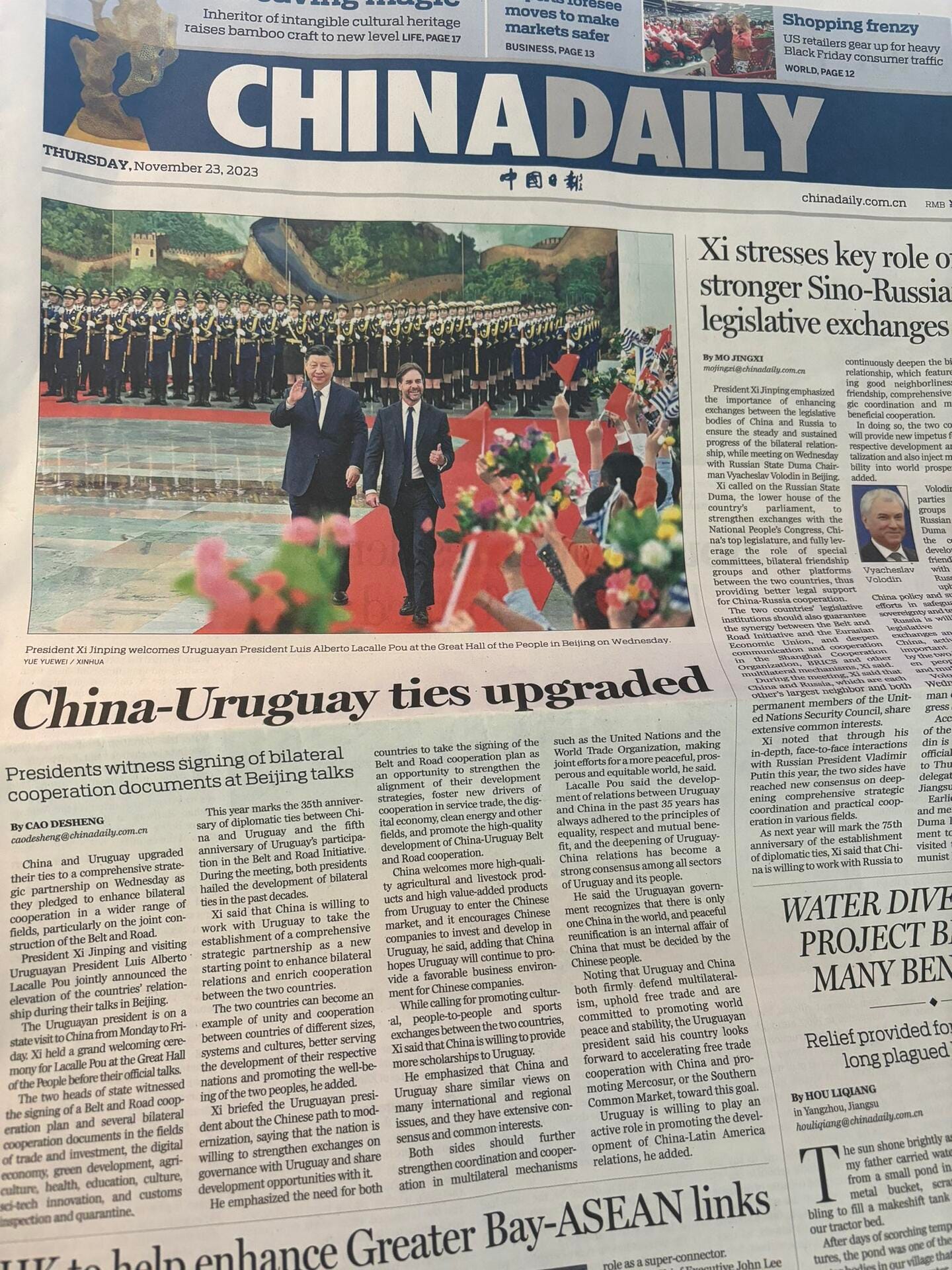
Demographics
Uruguay receives immigration from neighbouring countries in LATAM like Argentina and Brazil due to more favourable tax policies and Indians due to software consultancies. North Americans and Europeans are also choosing to retire in Uruguay. It's been refreshing to meet with many more libertarian minded people moving from the West. The country saw plenty of recent interest from both Russians and Ukrainians coming here too. This led to some political drama with a few dozen Russians obtaining fast-tracked and false passports to find their way into the country fast.
In years prior years, Cubans plus Venezuelans (and as mentioned Indians) came from abroad to work. There is a recognition and some grievances that they make the job market more challenging for locals. I have only heard of a few instances of people not feeling accepted by a very select few Uruguayans on one-off occasions. I know in many parts of the world however, this is becoming very much the norm.
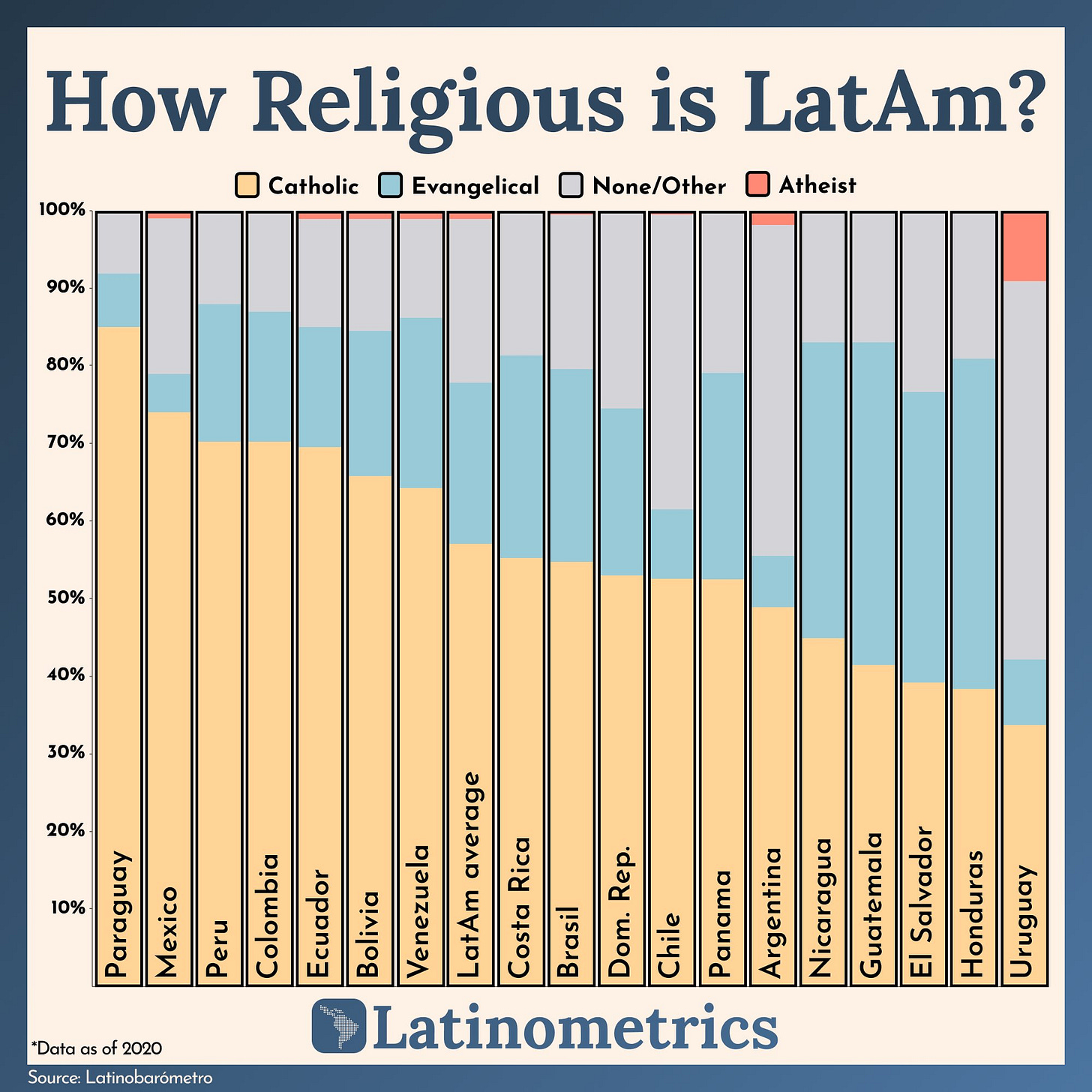
It's interesting to note that Uruguay is not such a religious country. Whilst Catholic is most common, over 55% stated in 2020 that they had no-religious affiliation. Despite that, Uruguay still has one of the biggest Jewish communities in the world. With the constitution providing freedom of choice over religion. Overall, there is close to zero animosity to any group here. Uruguayans know how to mix, which is a major selling point with the divided state of the world as it is right now.
Life expectancy has consistently been on the rise and 99% of the population is urban, vs 79% back in 1950. Uruguay doesn't have a large aging population currently and so looks better than most Western countries. It doesn't have Indian or even Nigerian base (right) but it's a respectable shape (far left) nonetheless:

Education
Uruguay consistently ranks among the top in Latin America for education quality, literacy, and school attendance rates. The country’s commitment to education is evident in its free, compulsory education system that is accessible to all. Uruguay's one laptop per child initiative was apparently really successful when implemented in 2007.
English is also well spoken amongst younger groups particularly in the cities, more so than in most countries in South America. Schools also tend to focus on English English rather than American English. Uruguay is ranked 4th in LATAM. The only countries that apparently speak English better are Argentina, Honduras & Costa Rica. Plus English proficiency is rising in nearly all age groups, as seen below:

Homelessness
Uruguay stands out in Latin America for its higher income per capita, low inequality and low poverty. Yet homelessness is increasing on the streets of Montevideo, like in many parts of the world. There is a cultural safety net in the form of 'ferias' each Sunday, where it is common for some less fortunate to trade what they come across during the week at large local markets, along with a host of other vendors. These ferias are really popular with locals & tourists alike, especially La Feria de Tristán Narvaja. Note that it is not expected that you negotiate at these markets for the above reason. I learnt that the hard way.
Firearms
It is absolutely legal to acquire a gun in Uruguay. You will need a licence, and to obtain that you will need to pass a 'course' and submit some papers. In person this involves presenting criminal record checks, Uruguayan ID, proof of address, proof of income and 2 small photographs.
The course costs in the region of 7,000 - 10,000 pesos ($180-$250) and it takes around 2.5 hours. You will briefly talk to a doctor, a psychiatrist, perform a multiple choice test with others in class, before being taken to the range to practice. Assuming they have no reservations (they are gun-lovers), you will then be given a slip of paper for you to take to a separate location to submit your papers. Thereafter you will be able to visit the range or purchase firearms.
In Uruguay, each individual over 18 years can own up to 8 different firearms. To own more you will need to register as a 'collector'. Apparently there are 35 firearms for every 100 people in the country (30th worldwide). In 2021, there were 8.5 homicides per 100,000 in Uruguay relating to firearms.
The laws differ slightly to elsewhere. Should someone take possession of and use your firearm in Uruguay, providing it was stored correctly it is no longer your legal responsibility, but theirs instead.
Drugs
The country has legalised the consumption and production of cannabis, same-sex marriage, prostitution and abortion. The first half of 2023 saw more legal marijuana sales than the entire year of 2022.
It's been 10 years since they legalised weed and since then in 2017, pharmacies begun the sale of it. Apparently when purchasing via this route, it is mandatory to register as a smoker with the government.
Regions
Montevideo
If this write-up is of interest, you're likely to spend your first few days in the city of Montevideo...
When staying in the capital city, I would advise you focus your property or hotel search in one of 3 barrios initially. Punta Carretas, Pocitos or Buceo. There are others that have their charm and are extremely liveable, but having experimented a bit during the past year these 'barrios' offer everything you need within walking distance - shopping, beach, cafes & nightlife.
You will also feel extremely safe in these areas at any hour, perhaps more so than if you were in any other European city. Montevideo is scattered with intricate historical architecture, amongst modern apartment blocks and single-floor housing. There are surprises around every corner.
Montevideo is a great initial base to get connected and it never quite feels like being in a capital. Just 1.7million people live within the city area. That's around 50% of the entire population of Uruguay but a fraction of many geographically smaller cities in LATAM. My favourite underrated restaurant in the city is Carbonada, it really is top notch and very reasonable.
Expo Prado is a must-visit event taking place in September, showcasing the best of Uruguayan agriculture inside the capital. As is Carnival week in January, where I recommend you watch the main event(s) on Friday or Saturday from Bar Sumo, Montevideo in a typical bar location or buy tickets in the stands.
Here are a few select snaps of the extremely varied architecture from Caza Casas on Twitter:
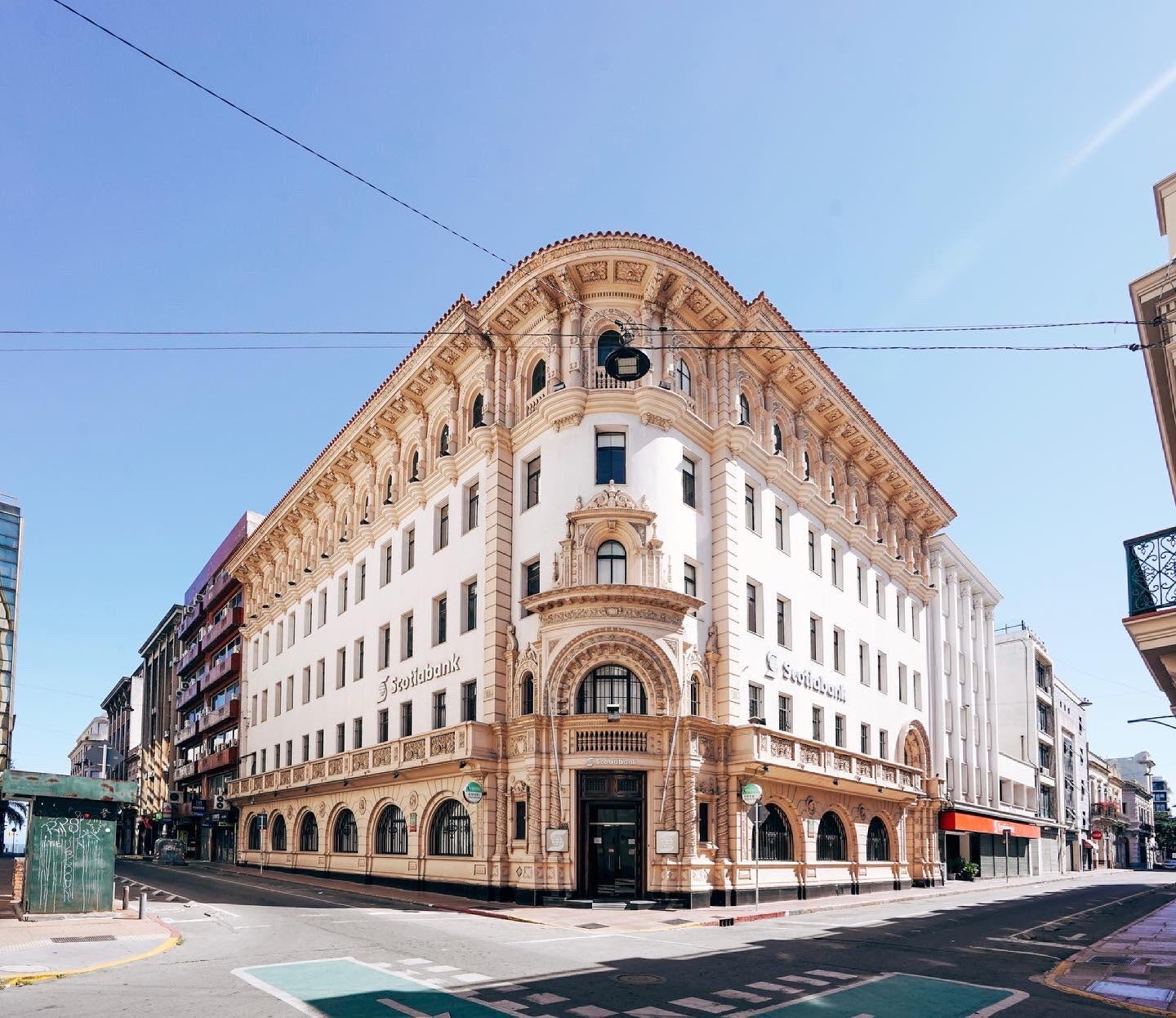
A common mistake I have witnessed people make is to reserve an extended stay in the 'old town' of Montevideo called Ciudad Vieja. It has plenty of photographic monuments and buildings to discover during a day or two, but at night-time you may feel a little more limited and less secure to walk around. If you stay there for more than a few days it may affect your first impressions of the capital & country, given it's proximity to the port and some poorer areas.
For instance on Saturday evenings the main market in Ciudad Vieja called 'Mercado del Puerto', features all the traditional restaurants. But come 6pm on a Saturday night of all times, it closes. This was after 10 years ago a number of tourists experienced issues after sundown. I gather the surrounding area is to be renovated in the coming years, but for now its a place to only keep on the lunchtime menu.
Punta Del Este
Punta Del Este is Uruguay's premier beach resort and therefore is a very popular destination offering properties that are significantly pricier than most other parts of the country. It is an area that has attracted a lot of Argentinian capital over the years. A lot of wealth.
The Mansa Side of Punta has calmer waters and is where most people live all year round. The houses are less prone to water damage over there apparently.
The Peninsula is where many older buildings are and where everything is in walking distance. Property there is extremely pricey, since it is where you'll find the Yacht club. It is also where the fishing boats and cruise ships dock, and so tourists flock there during high season.
On the Brava side of Punta Del Este, there is plenty of housing available because it's further out and a little further walking distance from amenities. It is much quieter, with empty buildings outside of summer months.
Nearby Punta Del Este
Maldonado is practically part of Punta Del Este and is a more affordable city than Punta Del Este. It is actually the second largest city of Uruguay. A great connected place to base yourself.
If you're seeking something more quiet you also have a number of small coastal towns called La Barra, Punta Ballena and Piriápolis. If you come with capital you are spoilt for choice in terms of finding beach-town property.

The towns of Minas, San Carlos & Pueblo Eden are a little tucked in from the coast. And are great options for a healthy balance between amenities and rural life. Moving north of these spots and going further in-land, Uruguay is extremely sparsely populated. Practically all farmland and forest.
Rocha
People I have met have said very positive things about Rocha. I plan to spend much more time in this region in the next year. The coastal towns in Rocha number less than a dozen. They are small places surrounded by nature with full-time populations that range from 90 to 3,500 people.
Towns like Garzon, La Paloma, La Pedrera, Punta Del Diablo, Chuy and Rocha (itself a town within the region). In this part of the country you will again find some good farms, fincas or campos but for a better price.
Even though Rocha is growing in popularity, you still find reasonably priced properties in La Paloma. This article from 2019 may be a few years old but will give you a glimpse into property and the upsides of living in the Rocha region.
For an additional taster of what it is like to travel to the East of Uruguay, have a read of this travel blog. I've included some stunning photography from it for this post.
Further East in Rocha you have the national park of Cabo Polonio, which is extremely inaccessible and untouched. There you can only arrive by 4x4 and all the houses have no electricity. It is popular for tiktok detoxes, hippie expeditions but also for normals too. I'm told it is an unforgettable experience being there and stargazing at night, both for locals and tourists alike.
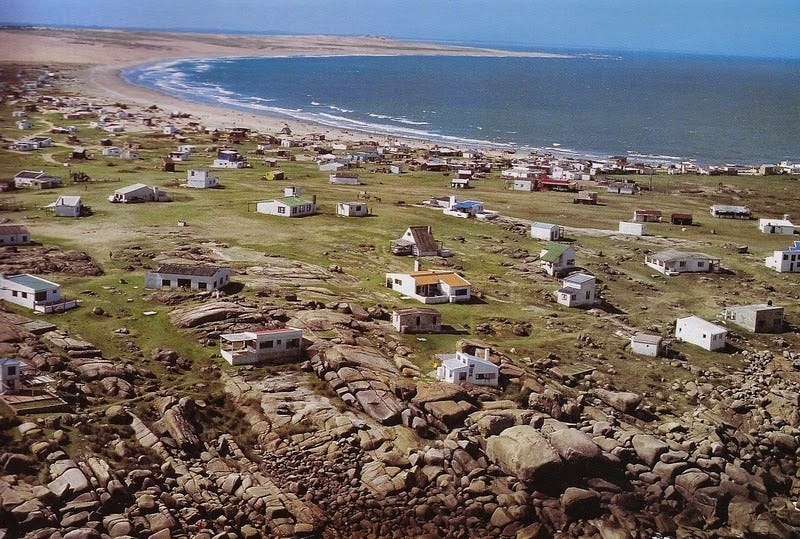
Just this week there was a video posted on a 'unique' housing development up the road from the Cabo Polonio attraction. I recommend a watch simply to get a glimpse into the variety of developments available in Uruguay.
Colonia
On the southern coast of Uruguay is a beautiful historic town called Colonia del Sacramento, great to take a trip down for a few days. It's a special place to walk around that can be visited by bus from the Tres Cruces terminal in the capital. It's most likely a little too quiet and remote for any of us folk to call home, but certainly not to be missed either.
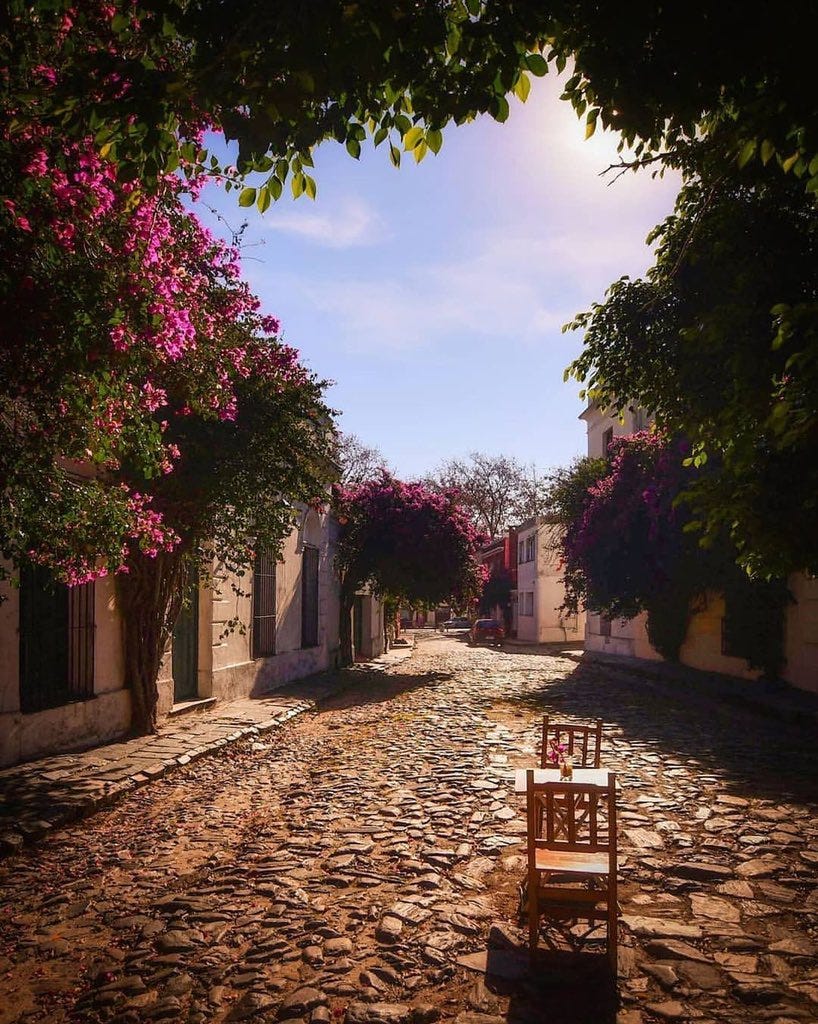
In-Land
Inside the depths of Uruguay heading North away from the coast, land is sparse and much more affordable. There you will find the "real" Uruguay. Rural landscapes, forests, vineyards, rarely-visited nature reserves and 'cowboy country'. You will find few people and more animals, but plenty of places to stay for a few days and learn the 'gaucho' way of life on horseback.

Thanks for reading!
So there you have it. If you want to know more about Uruguay and have questions for those of us living here, I would encourage you to get engaged with the Phyle community. Post your questions and get involved.
Whether Uruguay 🇺🇾 sounds like a free country, or a backwards bunker, only you can decide. For some of us at least, it's far too free to ignore...
Further Reading
Official Uruguay Links
Life - LiveInUruguay
Business - VUI - Business & Investments in Uruguay
Residency & Citizenship Services
Residency & Citizenship Reading
Taxes in Uruguay
Real Estate Reading
Other Useful Resources








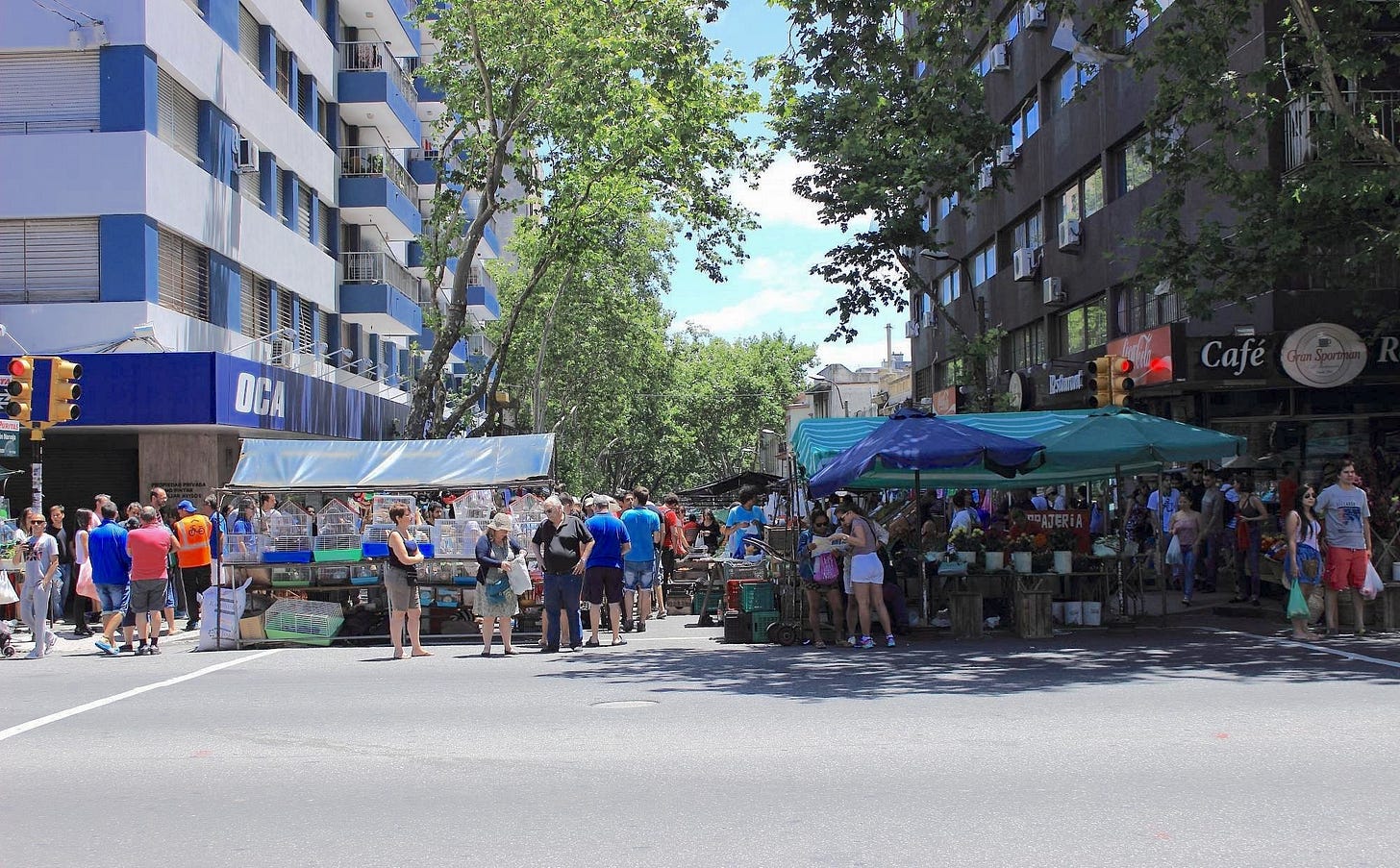

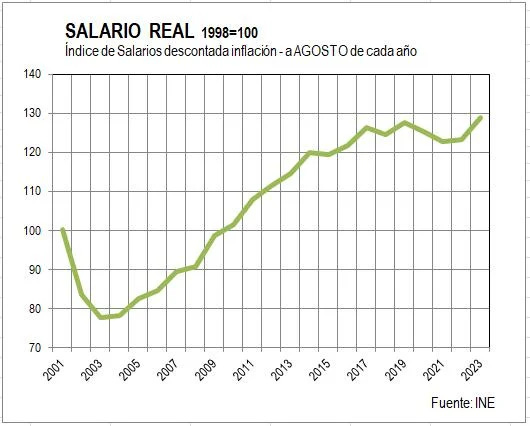
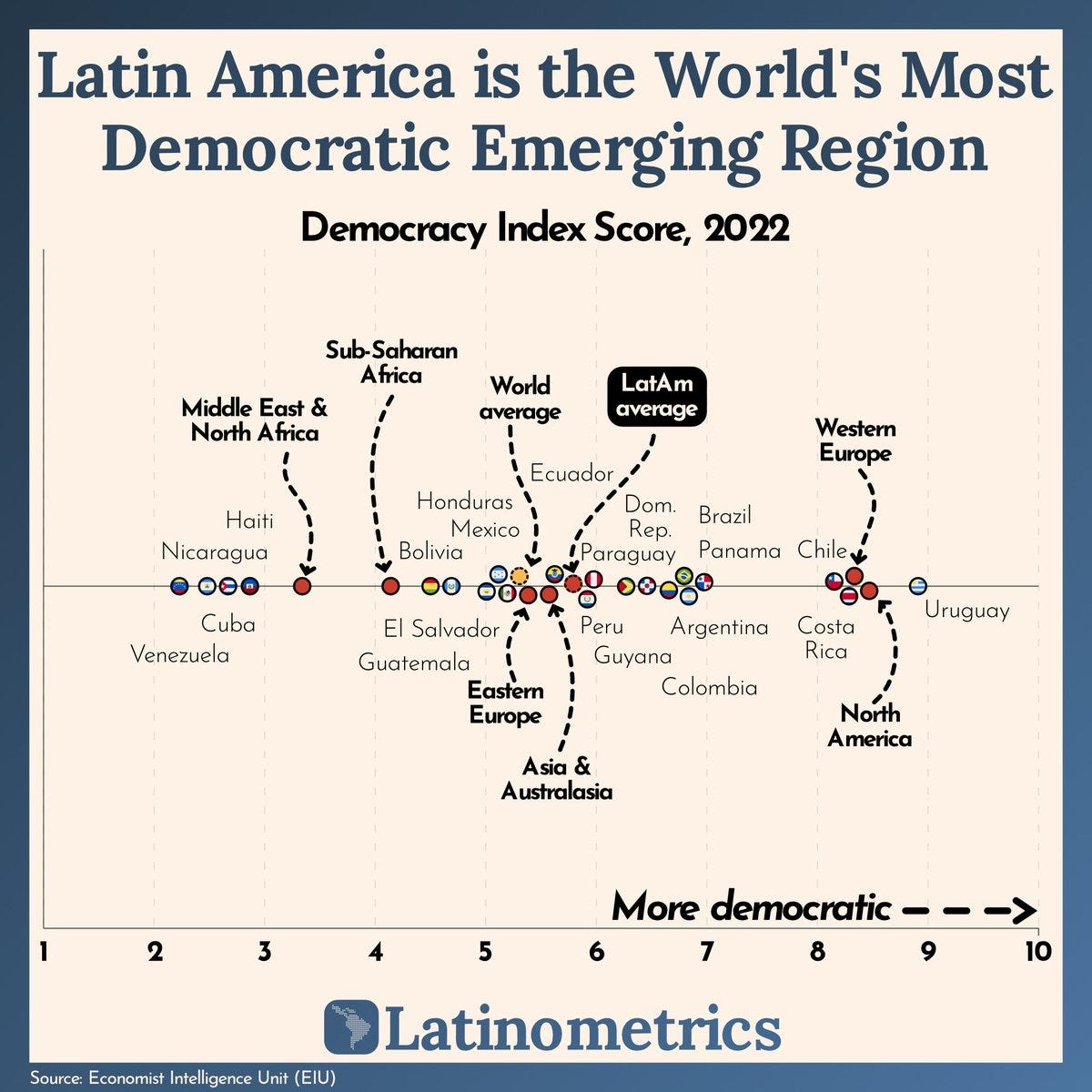


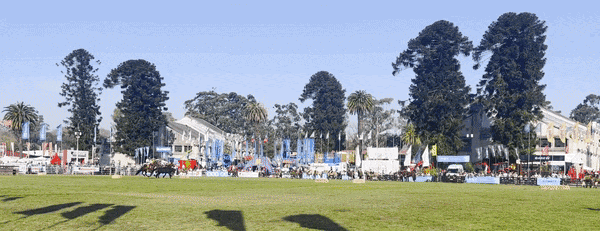
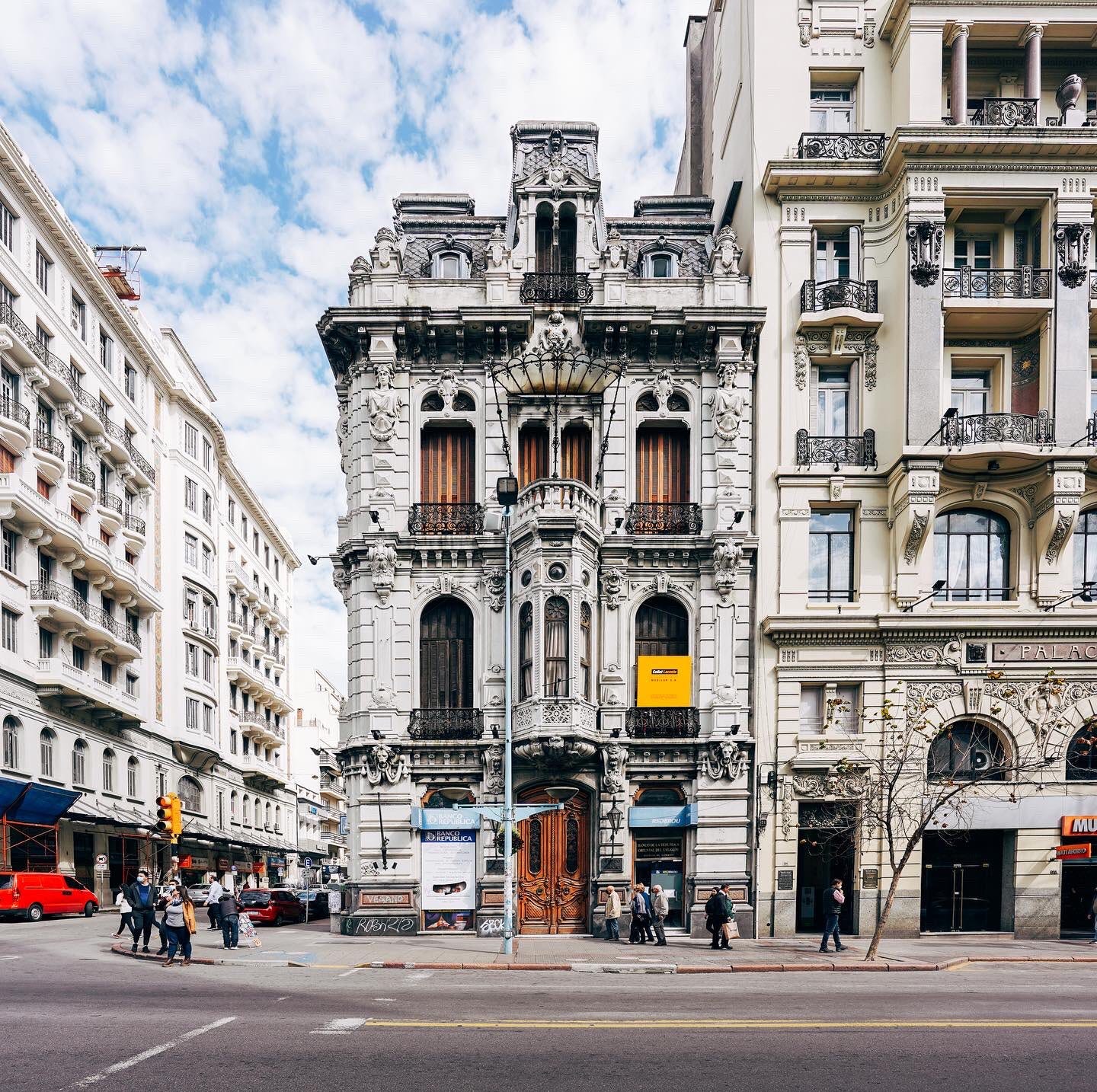
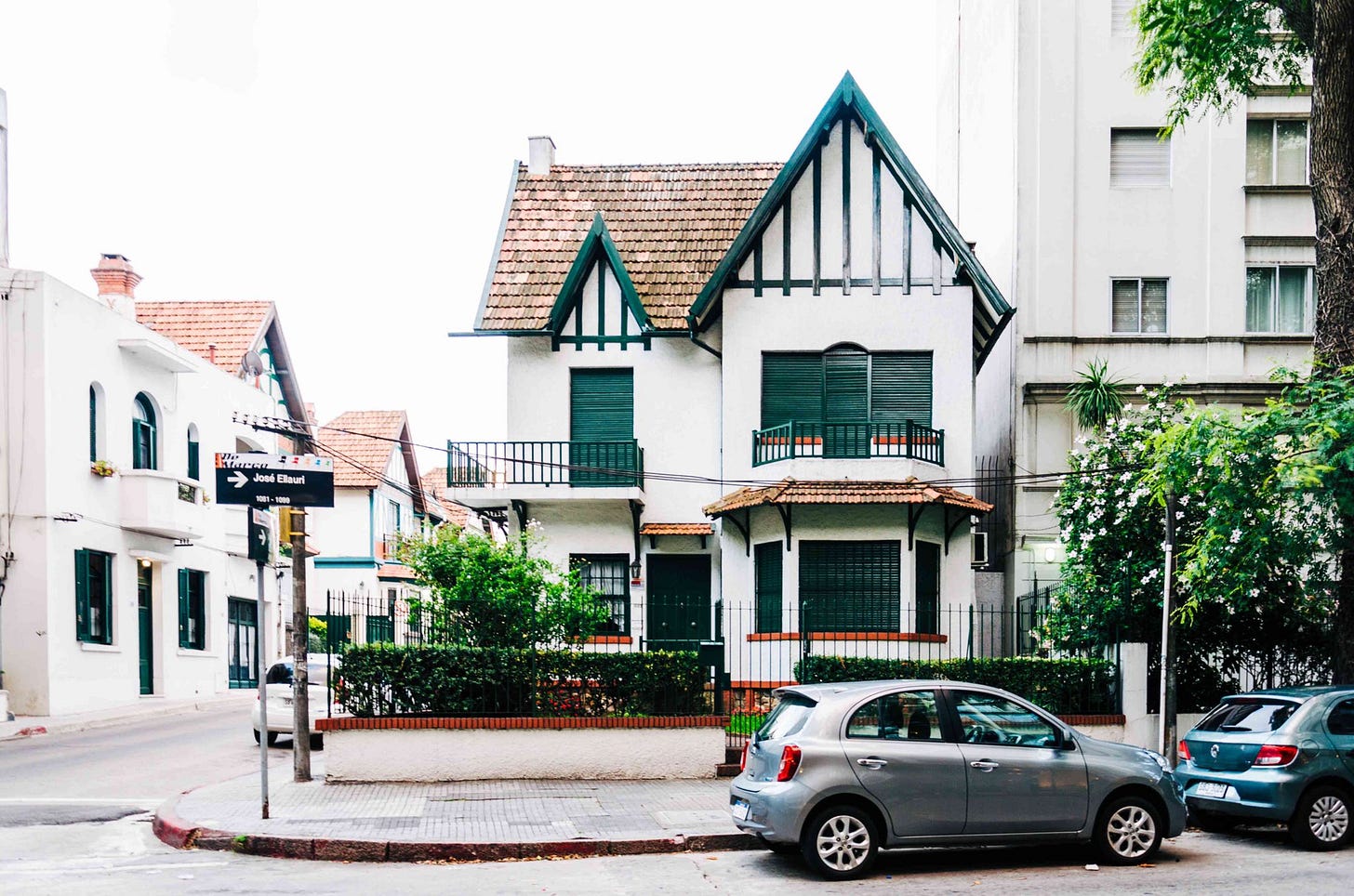
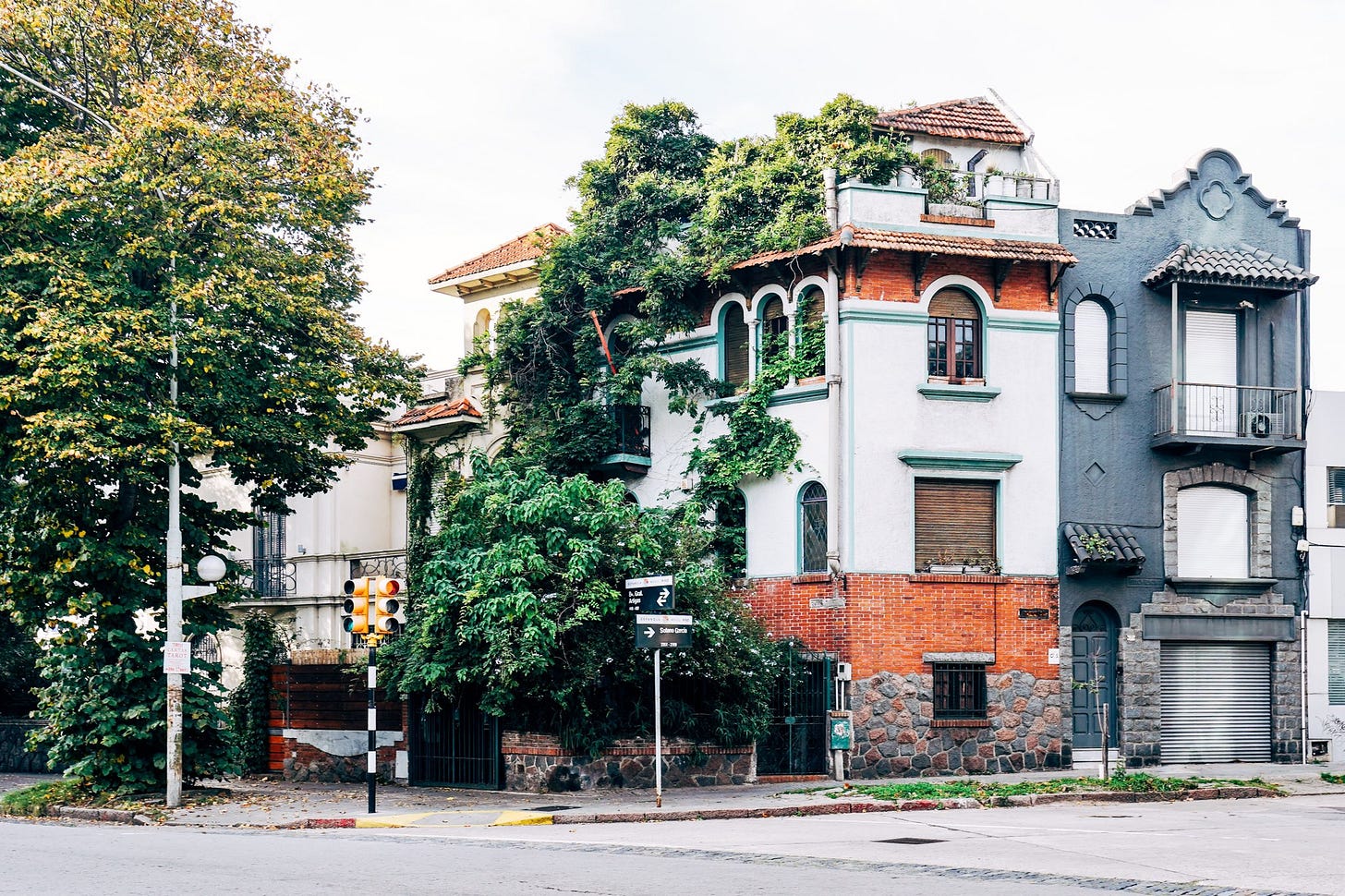

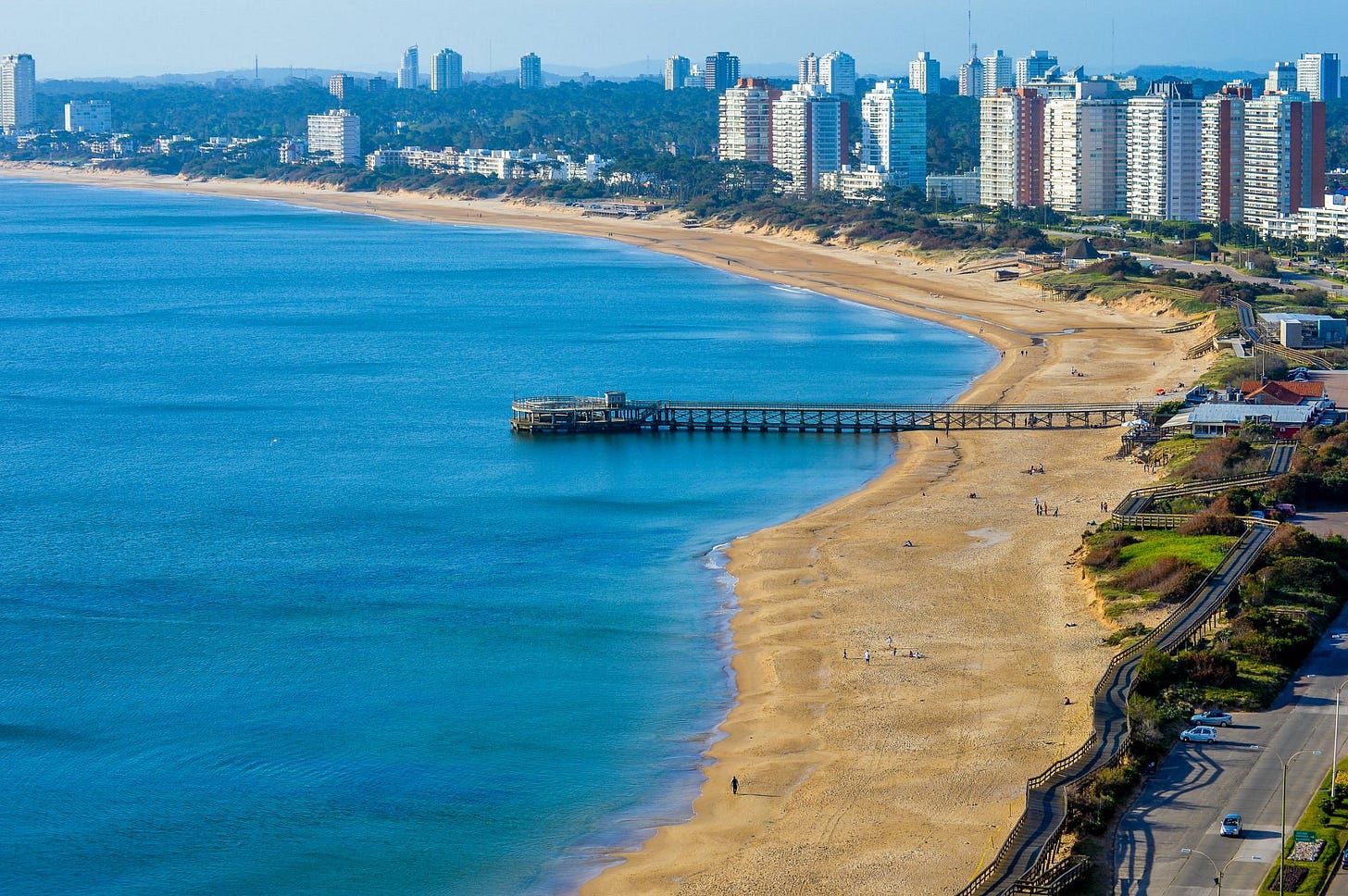
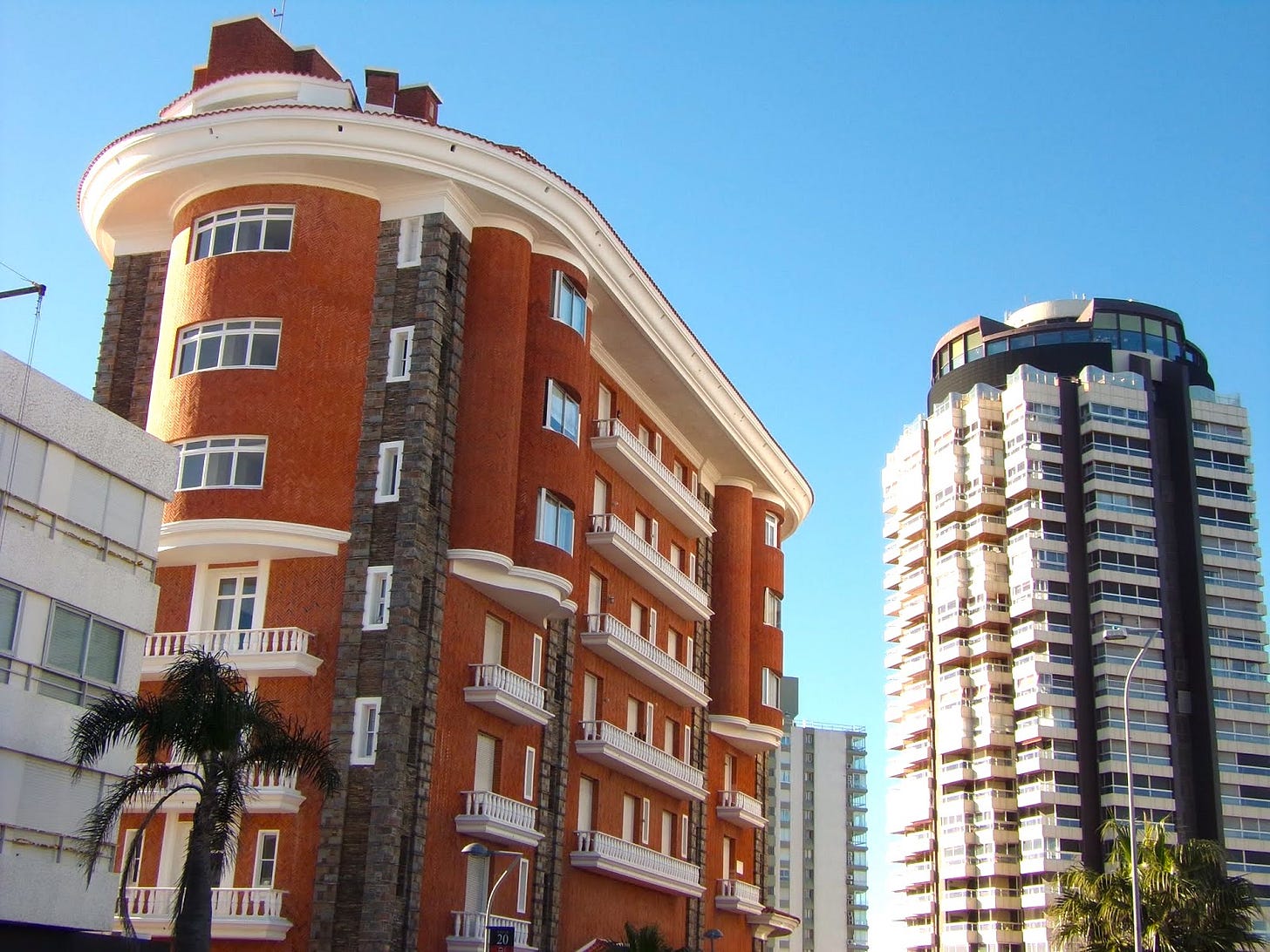

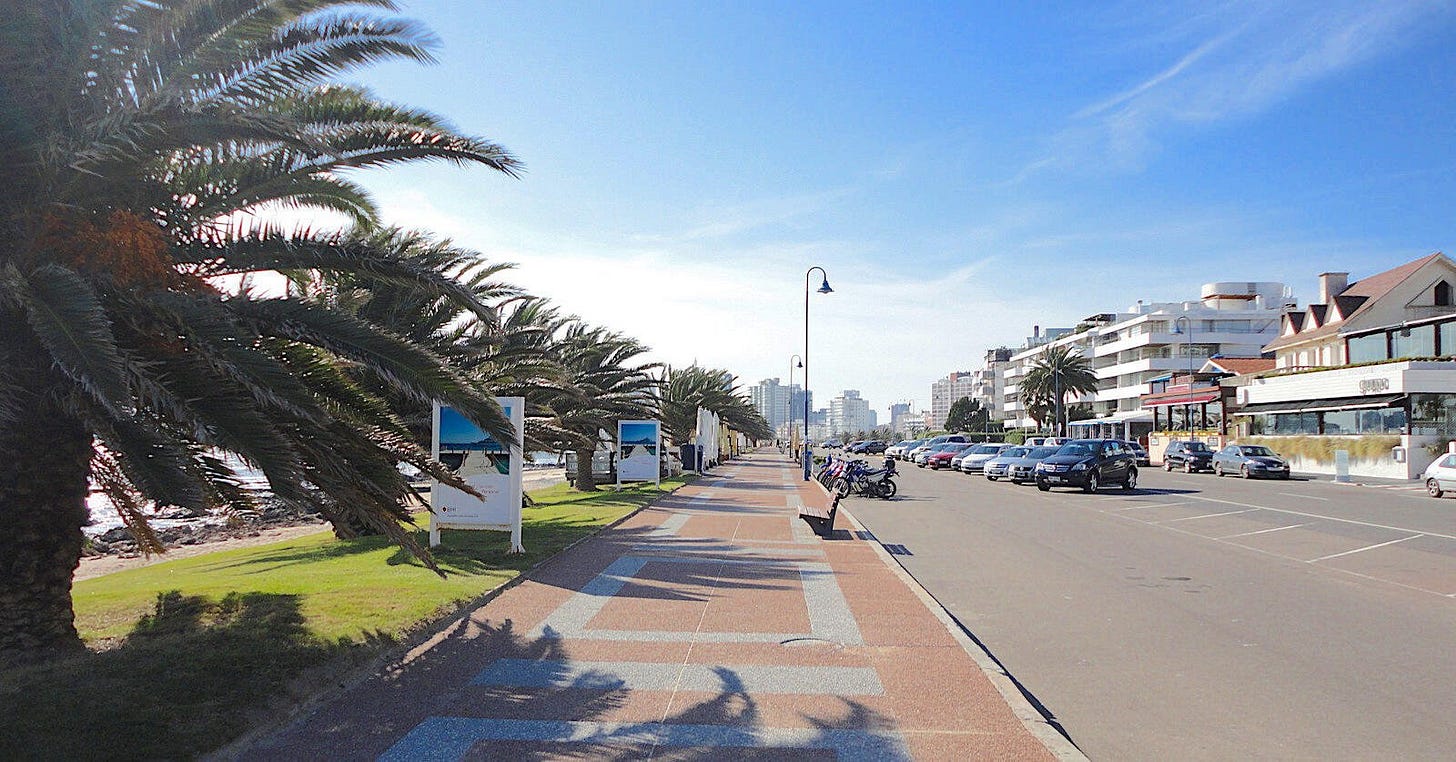
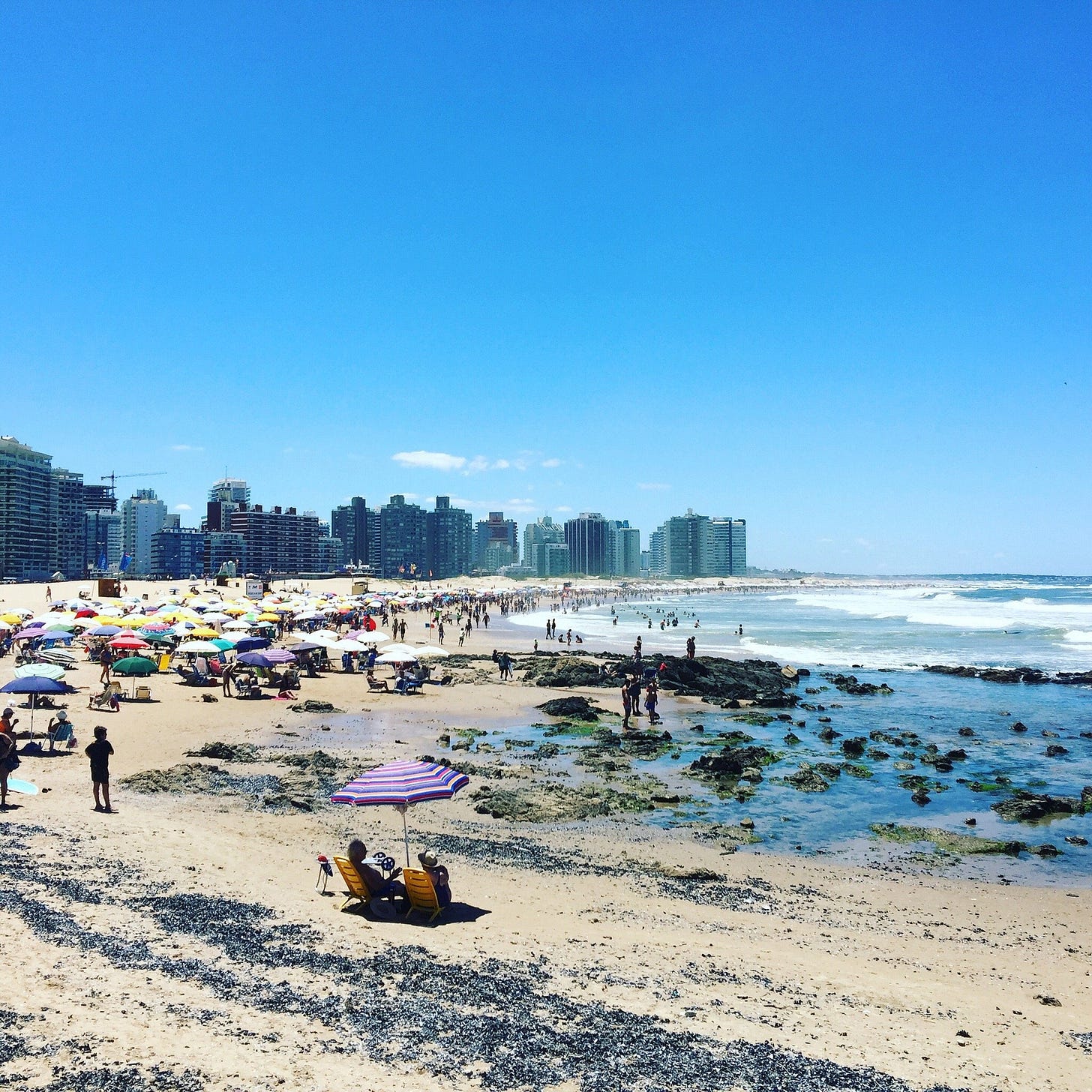
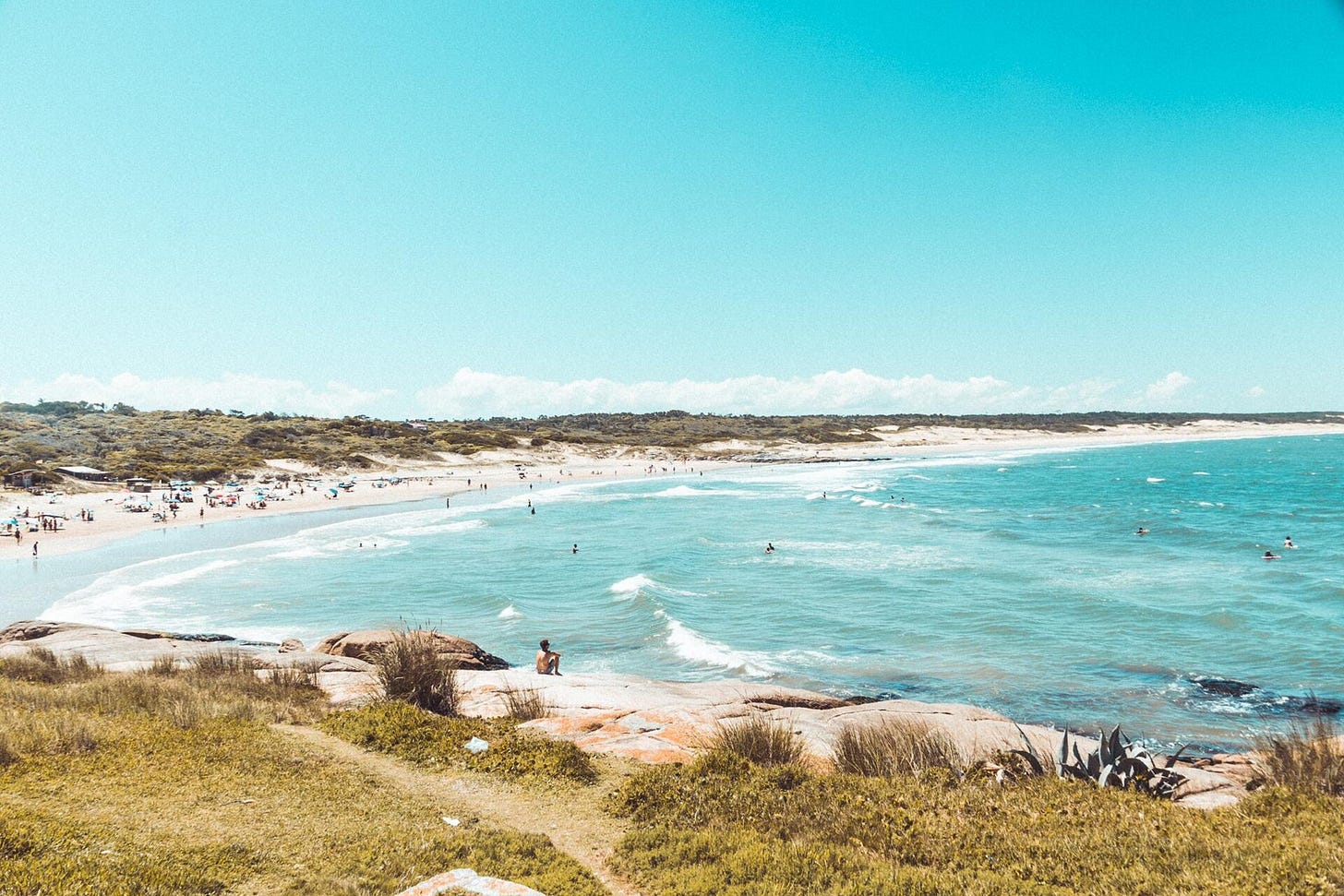

Thank you for the boots on the ground report. Great info.
Thank a lot for this profound article full of valuable information. I do not plan for leaving Europe, but each time the new totalitarism and the voluntary destruction of our continent shows its heads, I start looking for places ...
and Uruguay was one of the possible ones. We just had to start to learn Spanish :-)